Democracy’s Promise
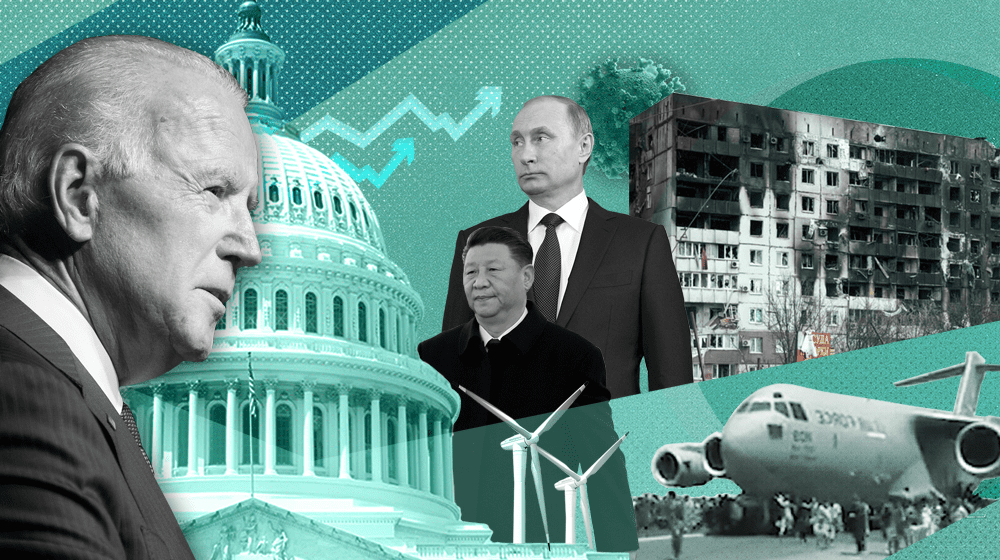
International Views of America in the Biden Era
June 2022
International Public Opinion: 2019 | 2020 | 2021 | 2022 | 2023 | 2024 | 2025
Explore how people from different countries view American democracy
Contents
Executive Summary | Introduction | Specific Findings | Recent Foreign Policy | Views of the United States | American Democracy | Conclusion | Methodology & Limitations
Some names and references have changed since the publication of this report, including references to the Eurasia Group Foundation (EGF), the former name of the Institute for Global Affairs
Executive Summary
As the Biden administration works to restore the credibility of the United States on the world stage, and faces multiple international crises, the Eurasia Group Foundation conducted its fourth international survey designed to investigate perceptions of the United States in nine politically and geographically diverse countries. Nearly five thousand survey takers were asked detailed questions about the United States, its democracy, and its global influence via an online survey.
In general, the United States and American democracy continue to be viewed positively
- In 2022, favorable views of both the United States and of American democracy increased, with support for both the United States and American democracy registering at 55%. This is the highest level of support in the four years of conducting the survey;
- Most respondents (60%) think American democracy sets a positive example for the world and about half (53%) think their own system of government should be more like that of the United States;
- Nearly 8 out of 10 survey respondents think the United States and China compete for influence internationally, with nearly three-quarters having a preference for the US as the world’s leading power;
- Respondents in Brazil, Poland, Nigeria, and India tend to have more favorable views of the US and its democracy compared to respondents in Mexico, Germany, Egypt, China, and Japan where results skew more neutral and negative;
- Respondents who are older and more educated tend to view the United States and its democracy more favorably;
But the United States loses esteem in China and is viewed less favorably in countries that are treaty allies of the United States
- In 2019, 44% of respondents in China reported liking American democracy. By 2022, that figure had decreased to 32%. The percentage of survey participants in China who reported strongly disliking American democracy nearly tripled from 2019 to 2022 (5% to 17%);
- Survey responses from countries which are treaty allies of the United States – Brazil, Germany, Poland, and Japan – indicate less favorable opinions of American democracy than results from countries which are not;
Still, many view the foreign policy decisions by the Biden administration positively
- More than twice as many respondents – 52% vs. 19% – think the United States has responded well to Russia’s invasion of Ukraine, the most frequently selected reason is because the United States avoided a direct confrontation with Russia;
- More than half of respondents think the United States’ management of the coronavirus outbreak sets a good example for other countries to follow — 52% compared to 41% in 2021;
- More than twice as many survey participants – 49% vs. 20% – support America’s decision last summer to withdraw its military forces from Afghanistan;
Respondents who think American soft power impacted their countries positively are more likely to have favorable views of the United States and its democracy
- Overall, American cultural imports (movies, music, and television) are viewed more positively (65%) among survey participants than American security cooperation, whether military-military collaboration (51%) or weapons sales (47%);
- Respondents who have visited or lived in the United States, or have family and friends in the United States, are more likely to view the United States and its democracy favorably. For example, among Chinese respondents, 53% who have visited the US hold favorable views of American democracy compared with 19% who have not visited;
- While a majority of respondents (61%) think the United States is responsible for maintaining international stability, nearly half (47%) also view the presence of American military bases in their region as a threat to their independence, a figure which reached its highest point in four years;
- Those surveyed who think US foreign policy should be more restrained are less likely to have favorable views of the US and are more likely to prefer China over the US as a world leader;
What America does at home influences how people view the United States and American democracy abroad
- When asked what would make American democracy more attractive in their country, the top three responses were: (1) the gap between the incomes of rich and poor people was smaller; (2) more immigrants and refugees were allowed to enter the US; (3) minority groups were treated more fairly.
Countries Surveyed
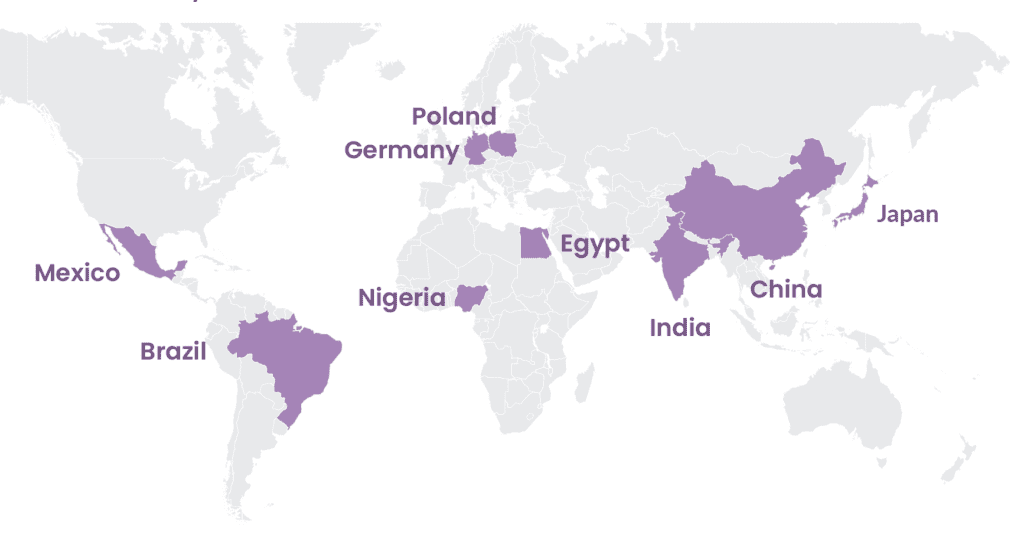
Brazilian respondents continue to look favorably on American ideas of democracy and most think their government should emulate the US. Most believe it’s good for their country if the US, rather than China, is the world’s leading power, and think the US military has a responsibility to maintain international stability. Nearly a third of respondents think America sets a good example for national development. Well over a third view the spread of nuclear weapons as the biggest threat to global security.
Chinese respondents do not look favorably on the US and more dislike American democracy than in any of the previous three years. Though most view American cultural exports positively, nearly two-thirds say America’s influence has a negative impact on the world. Militarized sources of US power are viewed negatively. More than two-thirds say US military bases threaten their national independence. More favorable views of America are found among respondents who are older and those with diaspora connections in the United States.
Egyptian respondents are split on American power. More than half think US military in-volvement promotes stability in their region, but nearly two-thirds think American military bases threaten their national independence. Neither American hard power nor soft power is viewed favorably. Nearly two-thirds think US-Egyptian military collaboration has a negative impact on their country. The impact of American media and nongovernmental organizations is also viewed negatively.
German respondents have neutral views of the US and its influence, though favorable opinions of American democracy increased this year. About two in five Germans surveyed think America’s influence has made the world and their region no better or worse, and many are unsure of the impact US soft and hard power has on their country. Roughly half think the US responded well to Russia’s war in Ukraine, and less than half support America’s decision to withdraw from Afghanistan.
Indian respondents hold favorable opinions of the United States. Most support America’s response to Russia’s war in Ukraine, its decision to leave Afghanistan, and its management of the coronavirus pandemic. A majority see the US as a source of stability. For Indian respondents, America has a responsibility to maintain international stability despite some countries’ objections. Most respondents hold American democracy in high regard and want their system of government to resemble that of the US.
Japanese respondents report largely neutral views of the United States and American democracy. American influence is seen by nearly half of those surveyed as making little or no difference in the world and in their region. Older respondents tend to view the United States in a better light. Many don’t know what impact American cultural products or US-Japanese military collaboration has on their country.
Nigerian respondents hold very favorable opinions of the United States and its style
of democracy. More than three-quarters like American democracy and would like their government to look like the US. Most see the US as a source of stability with a responsibility to maintain international order. Specific types of American soft and hard power are thought to have a positive impact on their country.
Mexican respondents have some of the least favorable views of the US. Nearly a third believe China would be a better world power than the US as many think China sets a good example for national development. While more than two-thirds think American cultural products have a positive impact on their country, a plurality report negative views of American weapons sales. More favorable views of America are found among people who have visited — or have connections to their country’s diaspora in — the United States.
Polish respondents have favorable views of the United States and all forms of American power. Most see America’s military involvement in their region as a pillar of order. More than two-thirds support the United States’ handling of Russia’s war in Ukraine and a plurality support America’s response because it strengthened the Ukrainian resistance.
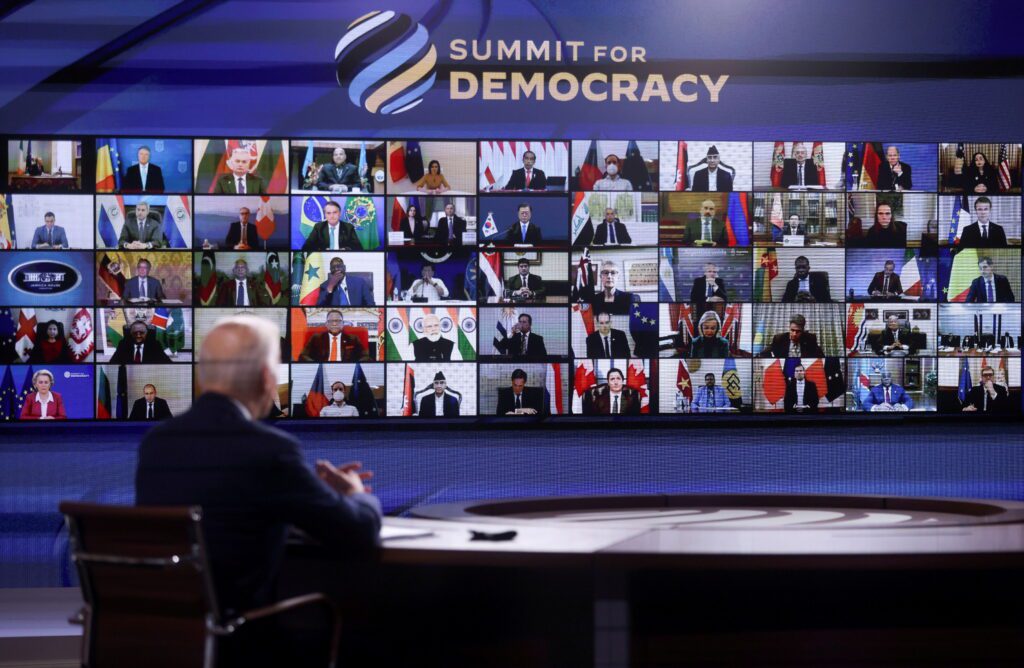
Introduction
This report arrives at a critical moment for democracy worldwide. Russia’s war in Ukraine has been cast by some in the media as an assault on democracy itself. Though this characterization likely obscures the Kremlin’s motivations and the West’s stakes in the conflict, the invasion has reinvigorated at least one alliance of democratic countries: the North Atlantic Treaty Organization (NATO). The outbreak of war also follows a number of public debates about the durability and desirability of democracy in an era when, internationally, democratic institutions have come under strain and more authoritarian political leaders have touted their ability to confront the coronavirus pandemic and climate change without the distraction of checks and balances.
When he arrived in the Oval Office, President Biden appeared to believe that democracy could use a boost in public diplomacy. In December, he hosted the first of two Summits for Democracy, bringing together world leaders to address a looming democracy recession, which he characterized as a top “challenge of our time.”1 This trend has been chronicled empirically by the group Freedom House, which recently marked the sixteenth consecutive year of decline in global freedom.2 It also found nearly three-quarters of the world’s population lives in a country which faced deteriorating freedoms in the past year.3 A declinist narrative applied to the US as well. The summit was held in the shadow of the January 6 attacks on the US Capitol, one of America’s own dark moments with democracy.
The summit received some fair criticism, because democracy is not monolithic and the process of determining which countries were “democratic enough” to invite could hardly be an objective endeavor. As Steven Feldstein of the Carnegie Endowment for International Peace wrote of some of the invitees (three of which are included in our survey): “Brazil, India, Indonesia, Nigeria, and Pakistan are experiencing serious democratic backsliding, populist politics, and regular political violence. But they also have large populations, are important regional economies, and exert considerable influence on the international stage.”4 Nevertheless, if the United States intends to be a standard-bearer for liberal democracy, the decision to host a conversation about democracy’s challenges — including within the United States — seems sensible.
We at the Eurasia Group Foundation share a commitment to and curiosity about the state of democracy internationally. We also recognize that, before it is enshrined in laws and structured in political institutions, democracy exists in the minds and hearts of people.
For the past four years, we have surveyed people in a group of politically and geographically diverse countries to better understand their views of democracy in general, and of American democracy in particular. We also surveyed them about specific aspects of US foreign policy. A new generation of US lawmakers, raised politically amid the unsuccessful wars in Iraq and Afghanistan and at a time when America confronts stiffer geopolitical competition from China, seeks to move American influence beyond mere military primacy.5 Our hope is that these survey findings might inform their understanding of international perceptions of their policies.
Of course, making foreign policy requires expert knowledge and painstaking judgment, and so it shouldn’t be driven simply by public opinion surveys — either domestic or international. But if President Biden seeks to project not simply the “example of America’s power but the power of America’s example,” it is worthwhile to study how that example is regarded around the world.
Several findings provide encouragement. For example, more survey participants this year compared to previous years indicated a favorable opinion of the US and its democracy. Views of America’s response to the coronavirus have improved since last year’s survey results, too. And there is broad international support for the US response to the war in Ukraine — driven in large part by support for its aversion to direct military confrontation with Russia.
Some findings are less encouraging. American security guarantees and alliances are often cast as mechanisms for, among other things, protecting and promoting democracy across the world. However, EGF’s survey responses from countries which are treaty allies of the United States — Brazil, Germany, Poland, and Japan — indicate less favorable opinions of American democracy than results from countries which are not — Nigeria, China, Mexico, Egypt, and India.
Still, as the US pursues its interests through hard power on the one hand, and soft power on the other, it’s worth considering what factors contribute most, and least, to positive perceptions of the United States, its democracy, and its international influence. As this report goes to print, highly publicized Congressional hearings into the January 6 attacks on the seat of American democracy are watched around the world. So this report’s key premise — that modeling democratic practices worthy of emulation could help the US advance the cause of democracy internationally — is particularly timely. Whatever your takeaway, we hope these data points contribute usefully to public debates about America’s international role, and its performance in its pursuit of it.
Who Took Our Survey?
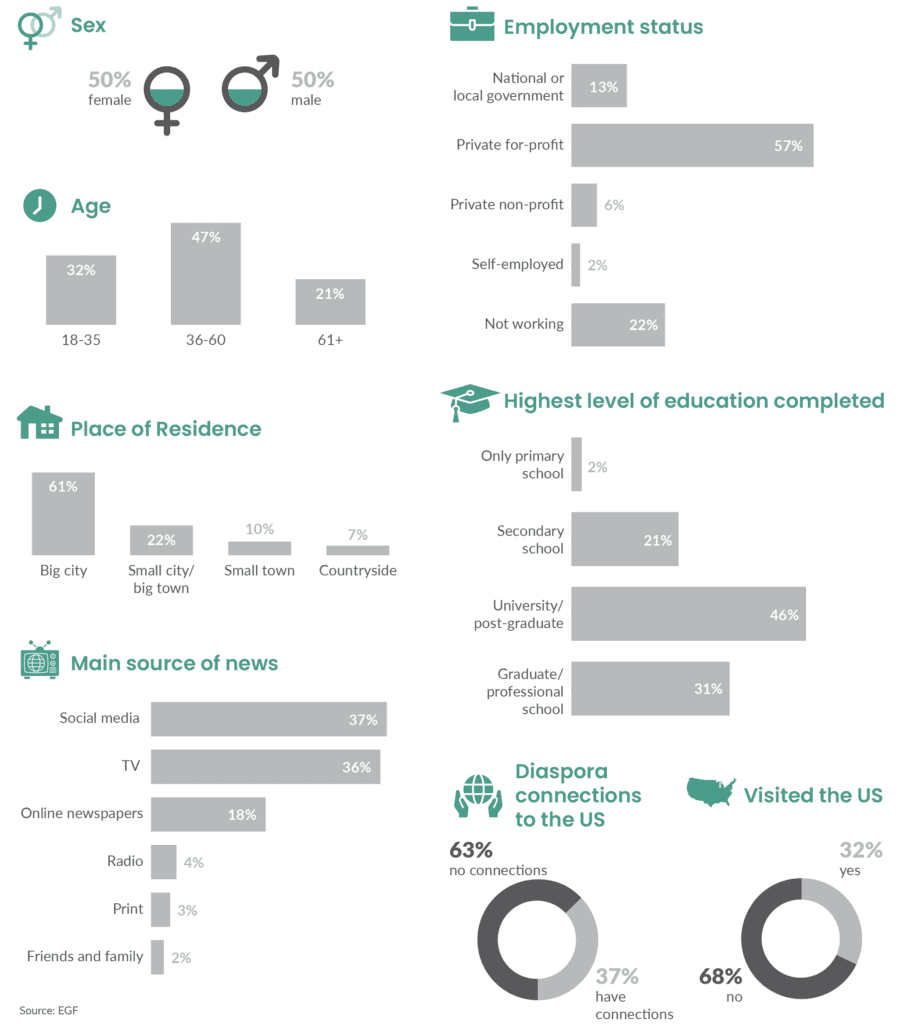
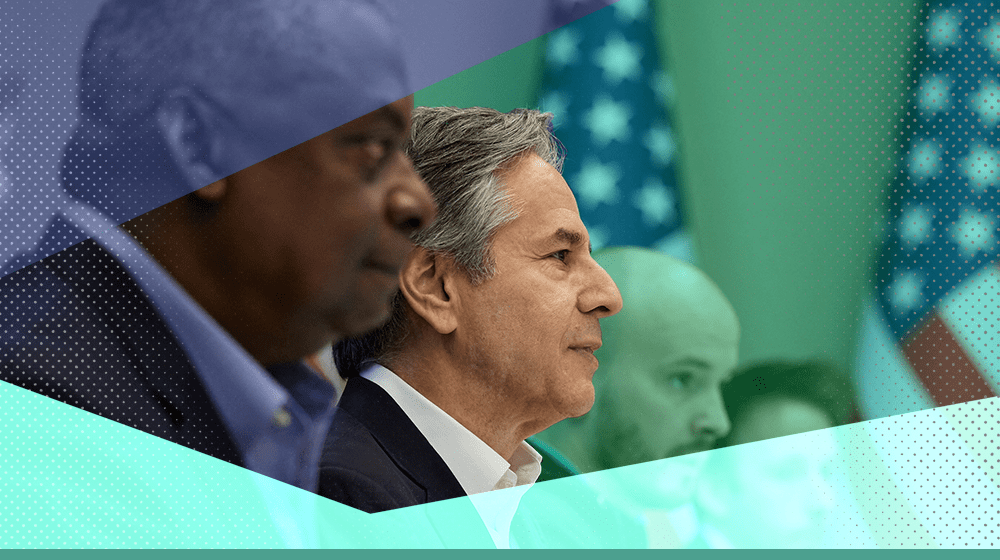
Specific Findings
Views of Recent Foreign Policy Decisions
Nuclear proliferation is seen by many as the greatest threat to international security, authoritarianism not so much
Climate change, nuclear proliferation, authoritarianism, terrorism, and great powers competing for influence are among the dizzying array of security challenges many countries confront today. When survey respondents were asked which threat they thought was the most significant to international security, a plurality said the spread of nuclear weapons — a view most pronounced in Brazil, Egypt, Germany, Mexico, and Poland.

More than one in five people think terrorism or powerful countries competing for influence is the biggest threat to global security. Given the Chinese government frequently cites the threat of terrorism for its crack-down in the country’s northwest, it is interesting to note that nearly one third of Chinese respondents think terrorism and violent extremism pose the biggest threat to international security.6
More than one-third of respondents in Nigeria view terrorism as the biggest threat. This is noteworthy given the enduring terror threat posed by Islamic State-affiliated groups in the north and growing herder-pastoralist violence in the middle belt of the country, and millions of dollars in security sector assistance the United States has provided to Nigeria to fight the terrorist groups over the last two decades.7
In India, a country which has struggled to contain various separatist groups and to ease tensions with neighboring China, nearly a quarter of respondents selected great powers vying for influence and nearly a quarter selected terrorism as the biggest threat.8
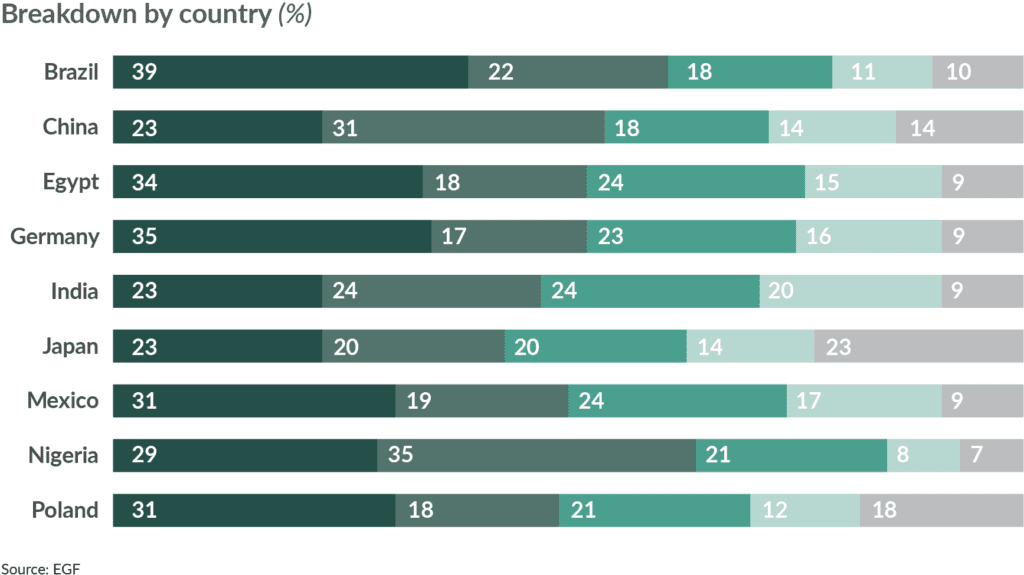
Climate change and authoritarianism were less frequently identified as major threats to international security. In Japan, however, just as many people — nearly a quarter — view authoritarianism as the biggest security threat as they do nuclear proliferation.
Most respondents continue to prefer the United States to China as the world’s leading power
Nearly eight out of ten survey respondents (78%) think the United States and China compete for international influence. American leadership continues to be strongly preferred over China’s. As in previous years, nearly three-quarters think having the United States rather than China as the world’s leading power would be better for their country (73%) and the world (74%).9

Preferences for a US-led or China-led world correspond with people’s political beliefs. Those with more liberal beliefs — gauged by how they answered a series of questions on the government’s ability to restrict certain types of social media expression, political protests, and the immigration of certain religious groups to their country — are more likely to prefer the United States than China as the world’s leading power. Conversely, China is more likely to be preferred by those with illiberal beliefs.10
For the third year in a row, America’s trustworthiness as an economic partner was the most frequent reason for thinking the United States would be better for their country. This year, America’s example for national development — nearly a quarter of all survey responses — replaced the United States’ history of working closely with their country as the second most frequently selected rationale.
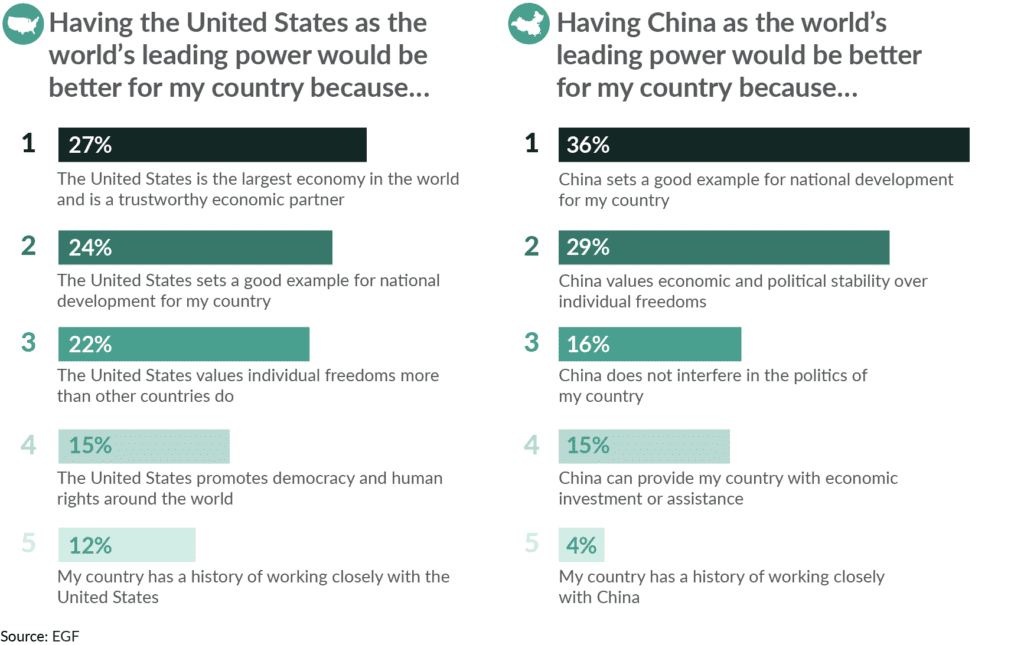
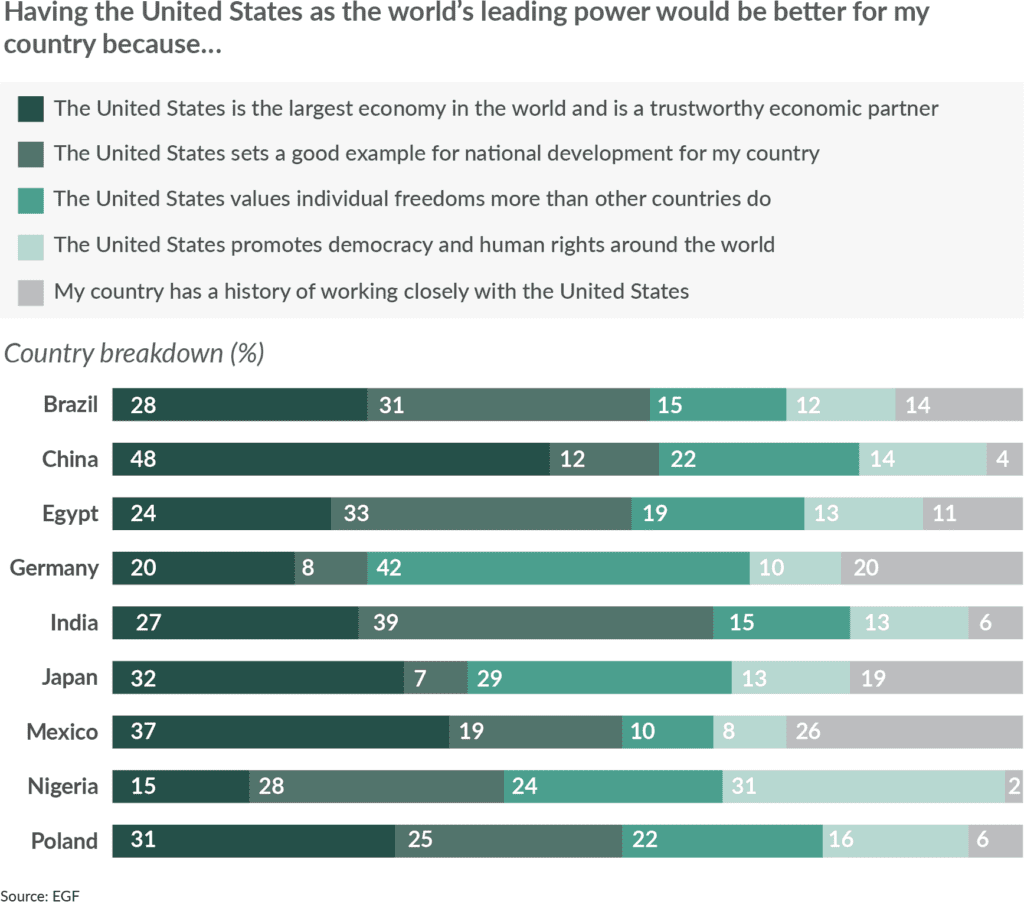
In seven out of nine countries surveyed, the top rationale for preferring American leadership is either economic cooperation or national development. Pluralities in China, Japan, Mexico, and Poland selected economic cooperation. In Brazil, Egypt, and India, pluralities chose national development. Nigerian and German respondents prefer the United States for other reasons. More than a third of Germans surveyed report it’s because America values individual freedoms more than other countries. In Nigeria, nearly a third of respondents like the United States for its promotion of democracy.
Among respondents who prefer China, the top rationale is Beijing’s example for national development, which is closely followed by China’s preference for economic and political stability. And while respondents in every country except China prefer a US-led world, nearly a third in Mexico (31%) and Egypt (35%) think a China-led world would be better for their country. In both countries, national development was the most frequently selected reason for preferring China.
About two and a half times as many people surveyed support America’s decision to withdraw from Afghanistan as oppose it. This support was more intense in countries which are not treaty allies of the United States than in countries which are
In April 2021, President Biden announced the full withdrawal of US forces from Afghanistan.11 The last American troops departed Afghanistan on August 30, 2021, ending the United States’ twenty-year war in the country. The decision and management of the withdrawal, which preceded the collapse of the Afghan government, was praised by some as a logistical accomplishment,12 but widely criticized by politicians and the media in the United States and Western Europe.13
In last year’s survey, fielded before President Biden announced US forces would leave Afghanistan, 41%
of respondents thought the United States should keep troops in Afghanistan until the situation stabilized. In this year’s survey, when asked about their opinion of America’s decision to withdraw from Afghanistan, nearly half support the decision.

Survey results show America’s treaty allies are less supportive of the decision than nonallied countries. While more than half (57%) of respondents in nonallied countries back the decision, a third (35%) of people in allied countries do. This lack of support is partly a function of the large number of people in formally allied countries who report neutral views of the American withdrawal.14 Over a third in Germany (35%) and Poland (37%), and nearly two-thirds in Japan (66%), registered neutral opinions. Even so, pluralities support the decision in survey results from Germany (38%) and Poland (41%).
Afghanistan quickly descended into a humanitarian crisis following the Taliban’s takeover when foreign aid to the country dwindled and sanctions were enacted.15 Since its withdrawal, the United States has given Afghanistan more than $720 million in humanitarian assistance,16 and has released several billion dollars in frozen Afghan assets to the country in the form of humanitarian relief.17
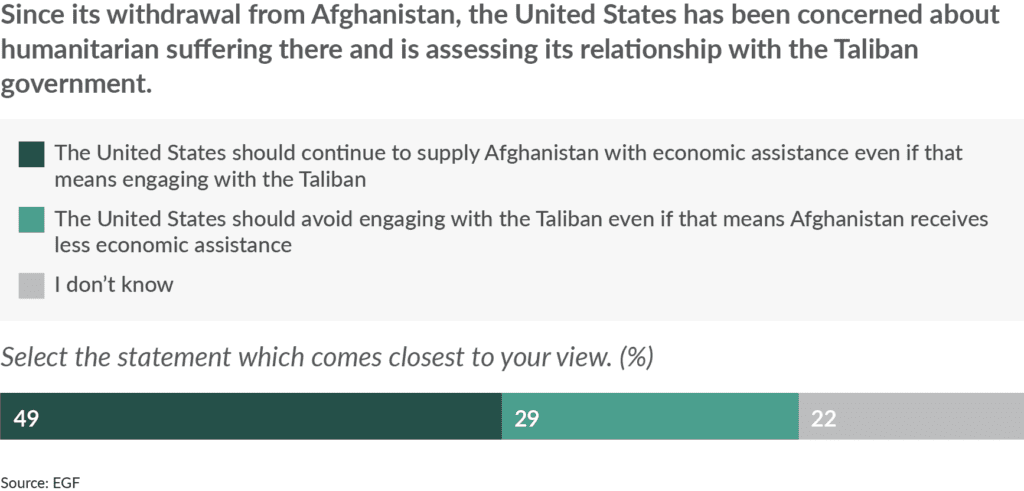
Nearly half (49%) of people surveyed think the United States should continue to supply Afghanistan economic assistance, even if it means engaging with the Taliban. In seven out of nine countries surveyed, more people support continued economic assistance than not. Germany and Japan are the two exceptions. In Germany, a plurality (42%) of respondents think the United States should avoid engaging with the Taliban, even if that means less assistance. Among Japanese respondents, more than half (58%) selected the response category of “I don’t know.”
A majority of respondents think America has responded well to Russia’s invasion of Ukraine
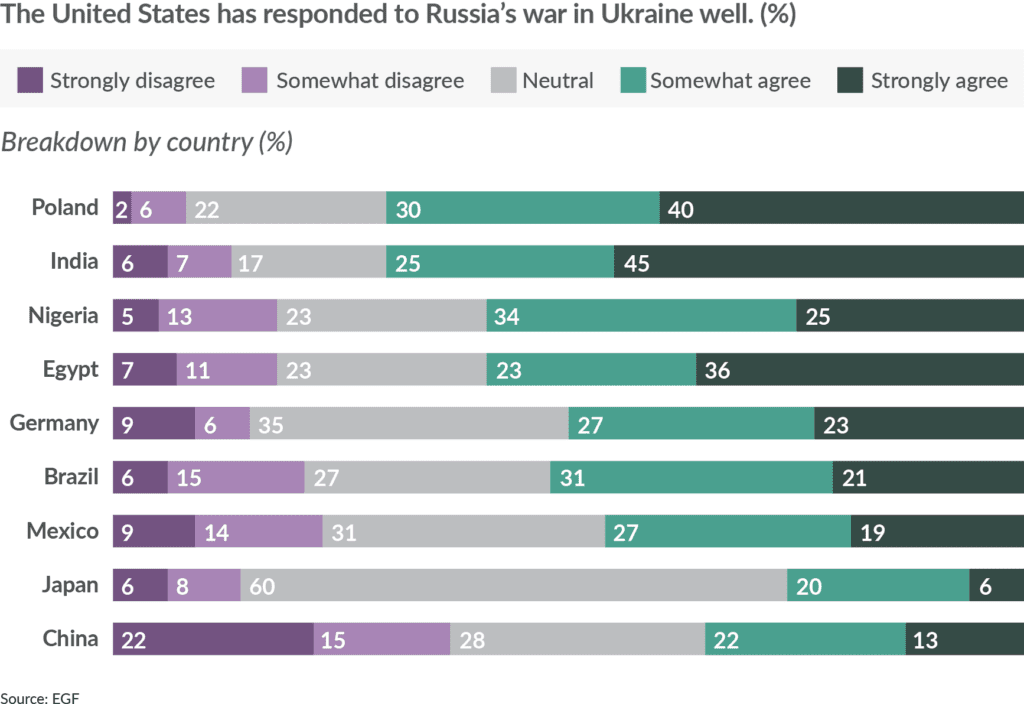
Since Russia’s February invasion of Ukraine, the United States enacted broad economic sanctions on Russia,18 supplied Ukraine with billions of dollars in humanitarian and military aid,19 and provided actionable intelligence.20 The response has been notable also for what it has not done. President Biden has repeatedly vowed not to send US troops to Ukraine,21 and his administration responded to Russian talk of nuclear readiness by calmly reassuring Moscow it isn’t under threat instead of matching Moscow’s escalatory rhetoric.22
Overall, 52% of respondents agree that the United States has responded well to Russia’s invasion while 19%
disagree and 29% hold neutral views.
In five out of nine countries surveyed, more than half of respondents think the United States responded well to Russia’s war in Ukraine. Agreement is highest in India and Ukraine-neighboring Poland, where over two-thirds agree with America’s response. In Germany, Ukraine’s other neighbor, views are mixed: While half of Germans surveyed think the United States responded well, more than a third hold neutral views.
China, Japan, and Mexico are the three countries where most respondents don’t think the United States responded well. While most respondents in Japan have a neutral view, more than a third of respondents in China disagree with America’s response to the war. In Mexico, more than half either disagree or hold neutral views. The survey failed to capture many reasons for assessing America’s response negatively. When respondents were asked to select their primary rationale why they thought the US responded poorly, nearly half selected “None of the above.”
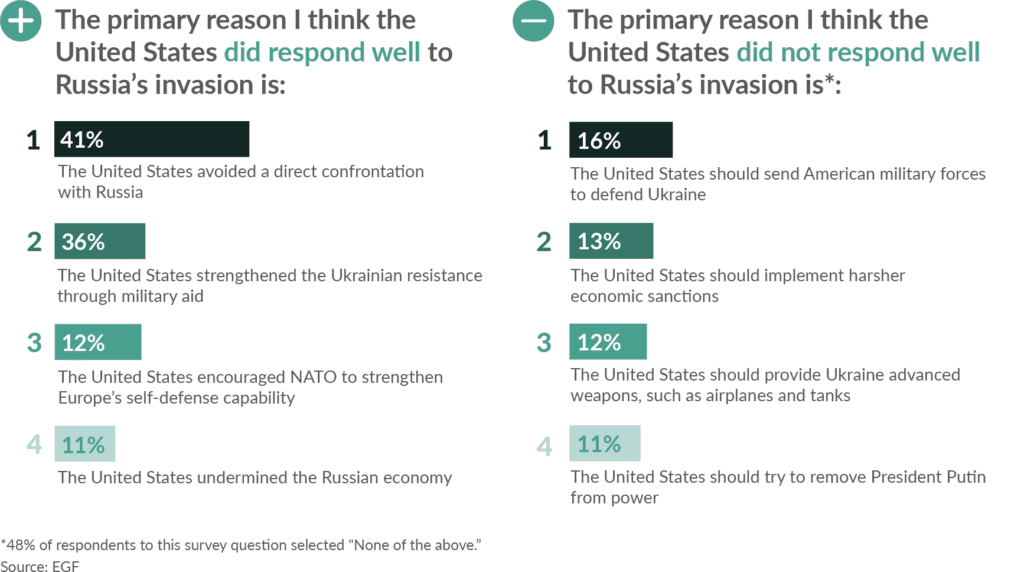
When those who agreed the United States responded well to Russia’s war in Ukraine were asked to select their primary reason why, most either said it was because the United States avoided a direct confrontation with Russia or because the United States strengthened the Ukrainian resistance through military aid. For nearly half of respondents in China (48%), Poland (48%), Japan (47%), and Germany (45%), the top rationale is America’s support for Ukraine’s resistance. In Nigeria (50%), Egypt (49%), Mexico (48%), India (45%), and Brazil (44%), nearly half primarily think it’s because a direct US-Russia confrontation was avoided.
Respondents were also asked to rank the most important goal the United States should consider in formulating its response to Russia’s invasion of Ukraine. Among all respondents, over half said avoiding a direct war between nuclear powers, over a third selected preventing the suffering of the Ukrainian people, and nearly a quarter marked preserving Ukrainian sovereignty.
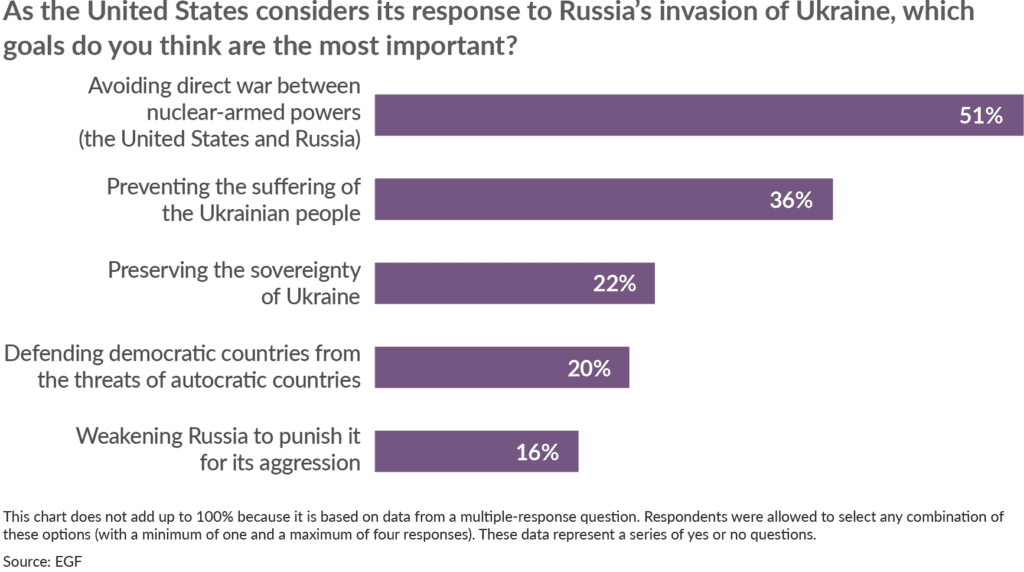
Unlike last year, most respondents think the United States’ management of the coronavirus pandemic sets a good example
As the world continues to grapple with the coronavirus pandemic, which began its global spread in early 2020, over half of the participants in this survey think the United States sets a good example for managing the pandemic — an improvement from last year when most people thought the United States set a bad example.
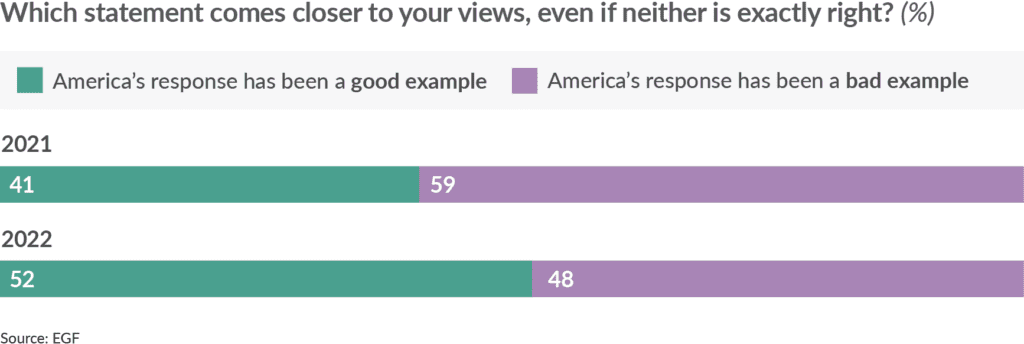
Among the nine countries surveyed, China (84%), Germany (65%), and Japan (54%) are three where a majority of respondents hold negative views of America’s management of the pandemic.
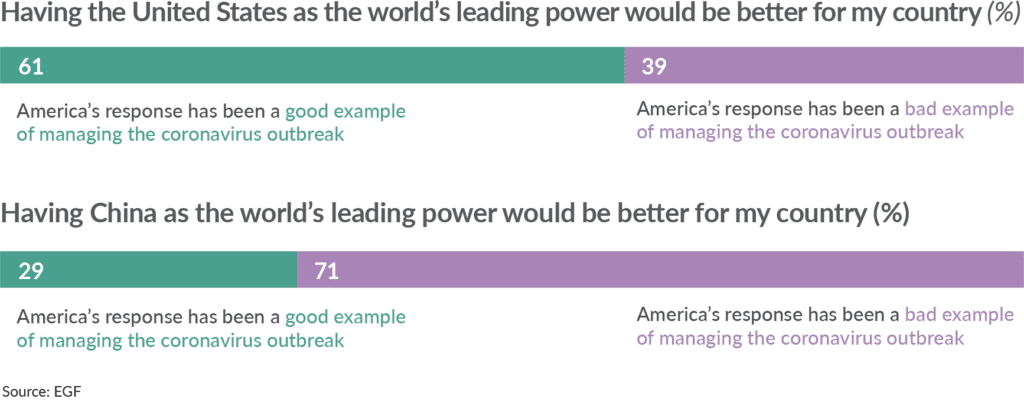
Preferences for a US-led world correspond with positive views of America’s management of the pandemic. Nearly three-quarters of respondents who think a China-led world would be better for their country also think America’s pandemic management sets a bad example, while most people who prefer the United States as a world leader view America’s example positively.

Views of the United States
In 2022, respondents are more favorable in their views of the United States than anytime in the past four years
As America effectively navigated difficult foreign policy challenges, favorability towards the United States increased. Between 2019 and 2021 favorable views of the US decreased slightly, while the percentage of respondents reporting a neutral perspective on the US increased.23 But in 2022 there was a small but significant increase in respondents’ favorable views of the US.24
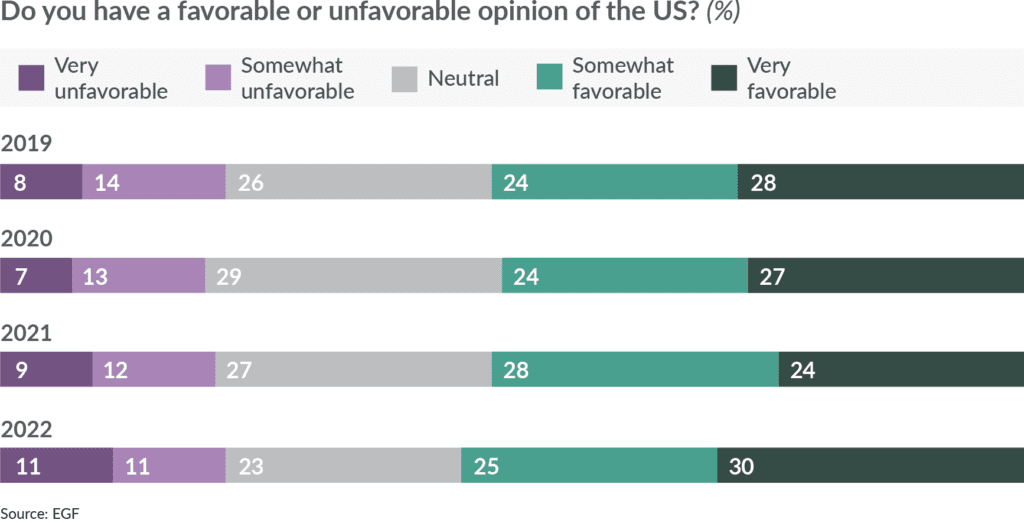
Half of respondents in six of the nine countries covered by this survey hold favorable views of the United States this year. But fewer than half in Japan, Germany and China have positive views. Part of the reason for the lower favorability in Japan and Germany is the relatively high percentage of respondents reporting neutral views. In Japan, a majority of respondents hold neutral views and about one-third of German respondents reported similar views. China has the highest percentage of respondents reporting very (27%) and somewhat (18%) unfavorable views of the US.
Across all nine countries, respondents over 61 years of age hold the most favorable views of the US, when compared to the other two age groups. More educated respondents, those with university and graduate school education, report more favorable views of the US as compared to those with only a primary school education.
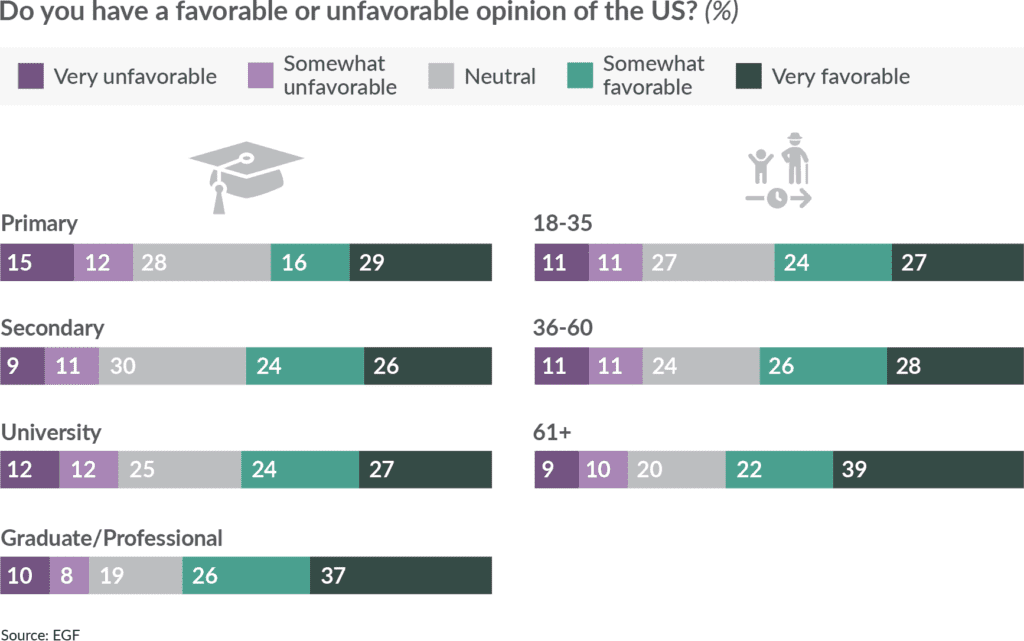
If respondents have diaspora connections to the US — if they have close friends or family living in the US — or they have visited or lived in the US, they are more likely to hold favorable views of the US as well.25
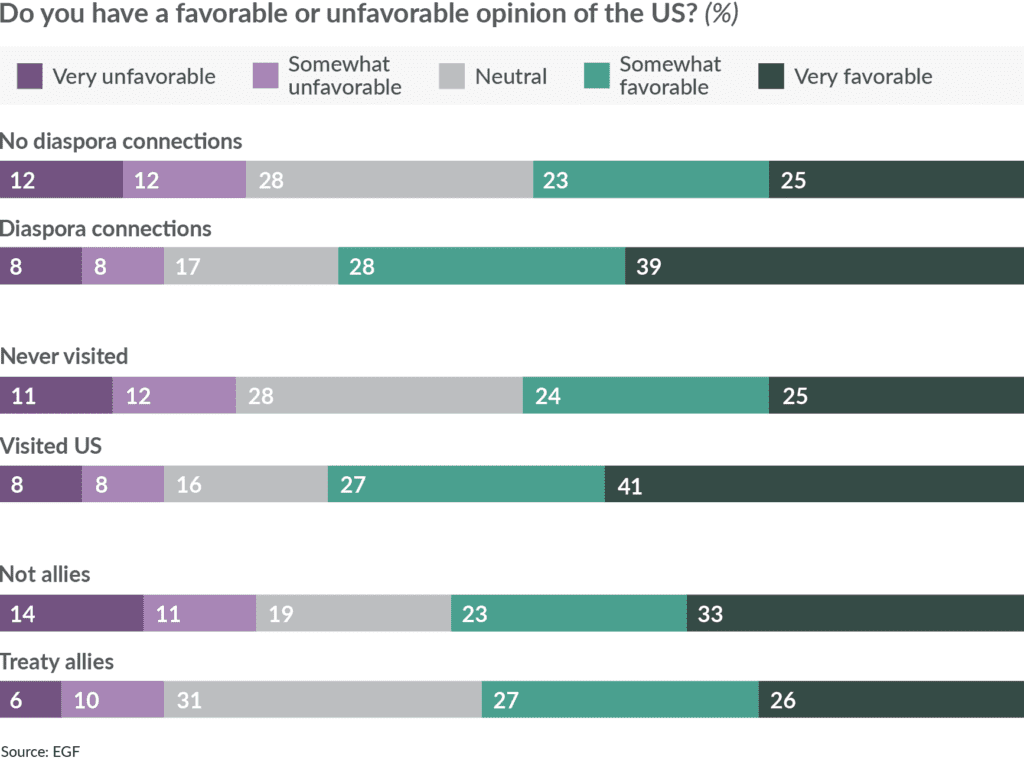
Brazil, Japan, Poland, and Germany have formal treaty-based alliances with the US. However, when comparing results from allied countries to nonallied countries, respondents in the latter group hold more favorable views of the US. This is partly influenced by large percentages of Japanese (57%) and German (31%) respondents who report neutral views of the US.
While nearly 60% of Japanese respondents reported neutral views of the United States, three factors positively affect views of the US: age, diaspora connections, and having visited the US. Japanese respondents older than 61 tend to see the US in a more favorable light, and those with ties to the US or have visited the US are more positive than respondents who have not visited and do not have any connection to the country.
Among Chinese respondents, three factors contribute to positive views of the US. People older than 61 hold more favorable views of the US than any other age group. There is a large difference between respondents who are over 61 and those under 36. Having diaspora connections to the US and having visited the US also contribute to more positive views of the US among Chinese respondents.
In both Mexico and Germany, having diaspora connections to the US and having visited the US are positive and statistically significant predictors of respondents’ favorability towards the US.
Approximately half of respondents think military-to-military cooperation with the United States and the sale of American arms has a positive effect on their country
How the US chooses to use its power, be it hard power — military force — and/or soft power — cultural, economic, and generally nonmilitary influence — may determine how favorably it is seen by those in other countries.
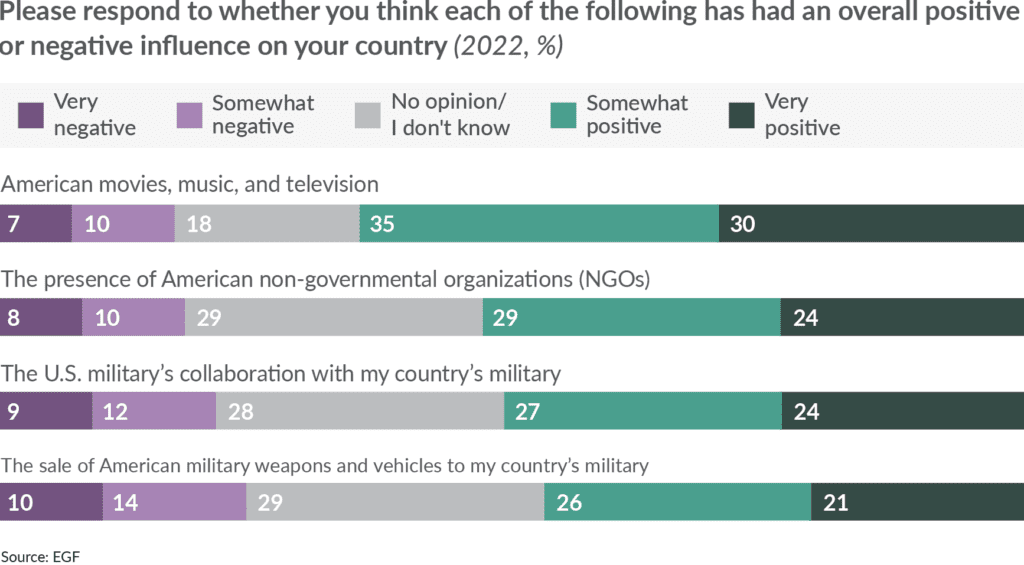
To estimate how different countries view American military power, survey respondents were asked if
the following forms of American hard power had a positive or negative impact on their country: (a) military-to-military collaboration with the US and (b) the sale of US military weapons and vehicles.
Half of respondents (51%) view military-to-military collaboration with the US positively and 47% view the sale of American military hardware positively. In five countries — China, Egypt, Japan, Germany, and Mexico — respondents held more negative views of military-to-military collaboration with the US and arms sales from the US.
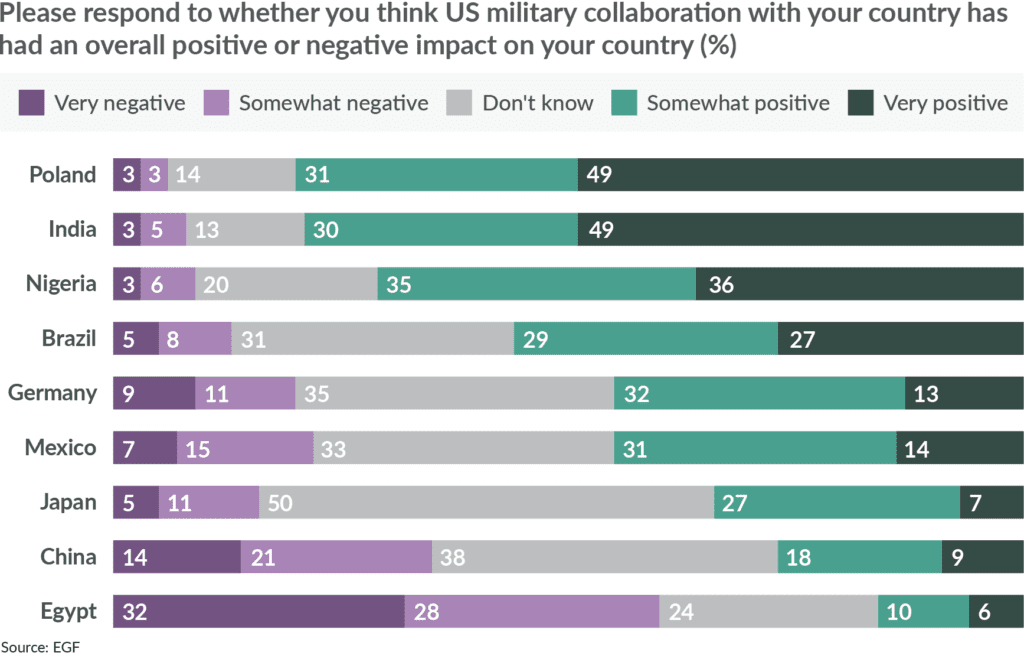
Egypt is a major recipient of American security sector assistance, and yet 60% of Egyptian respondents reported unfavorable views of military collaboration with the US.26 By comparison, in China, a near peer competitor of the United States, the unfavorable responses register at 35%. Less than half of the people surveyed in Germany and Mexico offered positive assessments of military-to-military cooperation with the US, even though both countries collaborate closely with the US on a range of military issues.27 In both countries more than one third indicated they did not know what kind of impact military-military cooperation has. Japanese respondents are not especially negative about military collaboration either, but 50% indicated they did not know whether its impact was positive or negative.
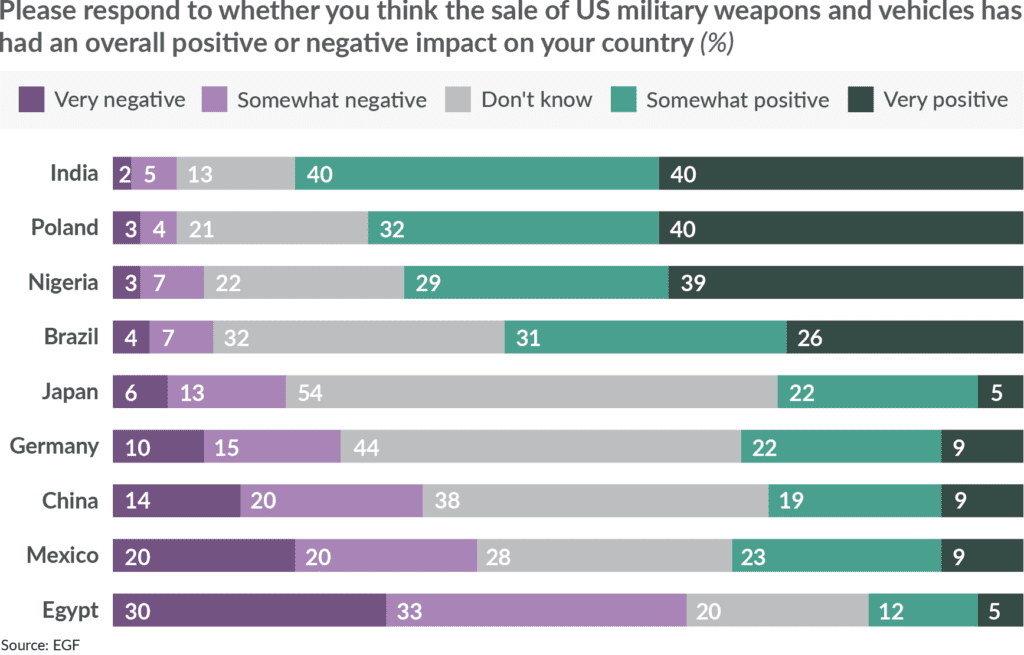
In China, Egypt, Mexico, Japan and Germany, majorities of respondents either offered negative assessments of the sale of American arms to their country or registered no opinion. In China (34%), Egypt (63%), and Mexico (40%), a plurality responded with an unfavorable view of the sale of US military weapons and vehicles to their country. Over half of those surveyed in Japan and almost half in Germany reported no opinion.
Higher education level corresponds with more positive views of the impact of both military-to-military co-operation with the US and arms sales by the US. Respondents with graduate and professional degrees have the most positive views of both military-to-military cooperation with the US and American arms sales. And, respondents who have connections to family and friends in the US or have visited are more likely to have positive views of arms sales by the US and military-to-military collaboration with the US.
Most survey respondents think American movies, music, and television positively impact their countries, but they think American NGOs have a less positive impact
To gather data on global attitudes towards American soft power people were asked how positively or negatively two issues have impacted their countries: (a) American movies, music, and television and (b) the presence of American non-governmental organizations (NGOs).
American movies, music, and television are perceived to be positive influences in all countries surveyed, except Egypt where results show 65% report negative views. Even in China, US movies, music, and television are viewed positively by 59% of respondents. Japan and Germany survey results show a relatively high percentage who do not know what the impact of American cultural products is in their country.
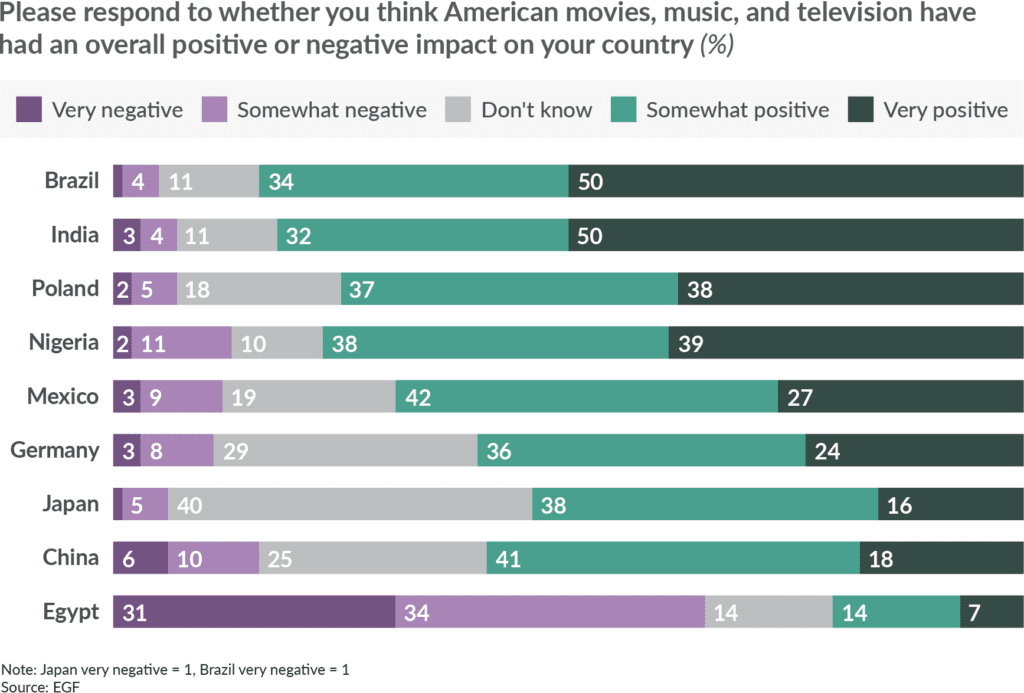
China, Egypt, Germany, and Japan hold less favorable views of the presence of American NGOs in their countries. While over 50% of people polled in Germany and Japan report neutral views, 54% in Egypt and 28% in China reported somewhat or very unfavorable views.
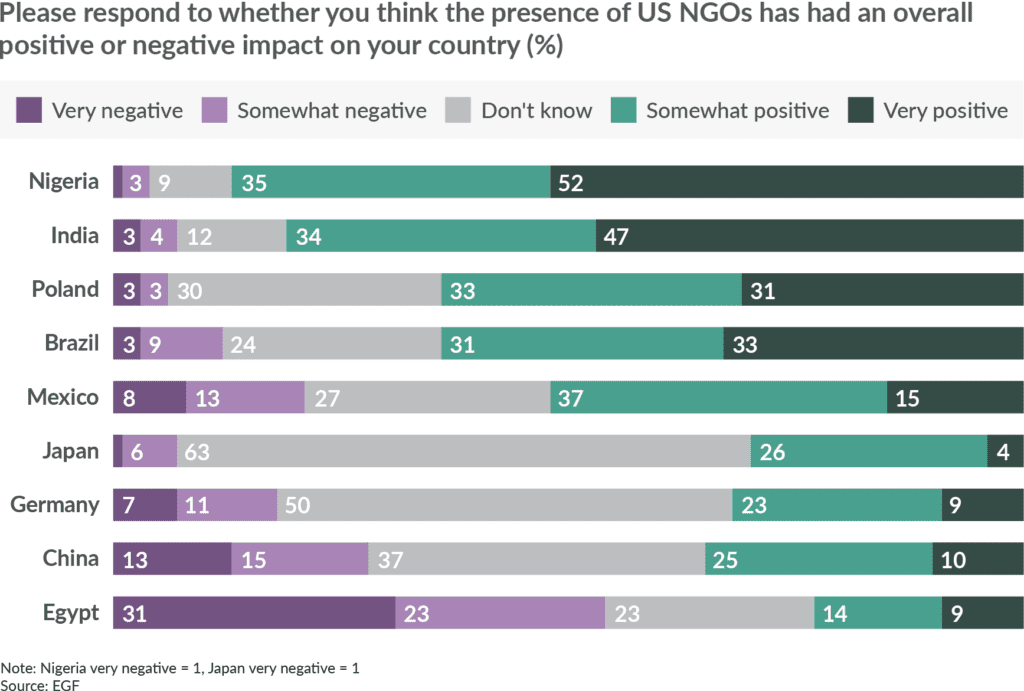
For most countries in the sample, the variables which contribute to positive perspectives on the impact of American soft power are age, level of education, and having connections to the US or having visited the country. More young people, those between 18 and 35, think American soft power has a positive influence on their countries than other age groups. Respondents with graduate and professional degrees are more likely to think American soft power positively impacts their country.
In China, while more education increases the likelihood that people think American TV, music, and movies positively impacts their country, it decreases the likelihood they think American NGOs have a positive impact. Younger Chinese respondents reported the most negative attitudes towards having American NGOs in their country.
A comparison of the survey data on the forms of American power demonstrates that among people who took this survey American soft power is believed to have a much more positive impact on respondents’ countries than hard power. The sale of American military hardware is thought to have the least positive impact on respondents’ countries, while the presence of American NGOs and American cultural products are popular with more than half of survey takers.
Views of hard and soft power affect how people see the United States as well. And, survey takers who have positive views of American cultural products are more likely to have favorable views of the United States in general.
Most respondents think the United States has a responsibility to maintain international stability, and most also think US military involvement has promoted stability in their region
Survey participants were asked about the extent to which they agreed or disagreed with two statements: (a) the US military has a responsibility to maintain international stability even if some countries object to specific interventions, and (b) the US military’s involvement in my region of the world has effectively promoted stability.
Between sixty and eighty percent of people surveyed in Brazil, Egypt, India, Nigeria, and Poland agree that the US military has a responsibility to maintain international stability even if some countries object to specific interventions. More than one third in China (35%) and Mexico (30%) disagree that the US military has this responsibility.
Similarly, while majorities of respondents in Egypt, India, Nigeria, and Poland agree that US military involvement in their region has promoted stability, more than half of people in China (59%) and over one quarter of people surveyed in Mexico (26%), Egypt (29%) disagree.
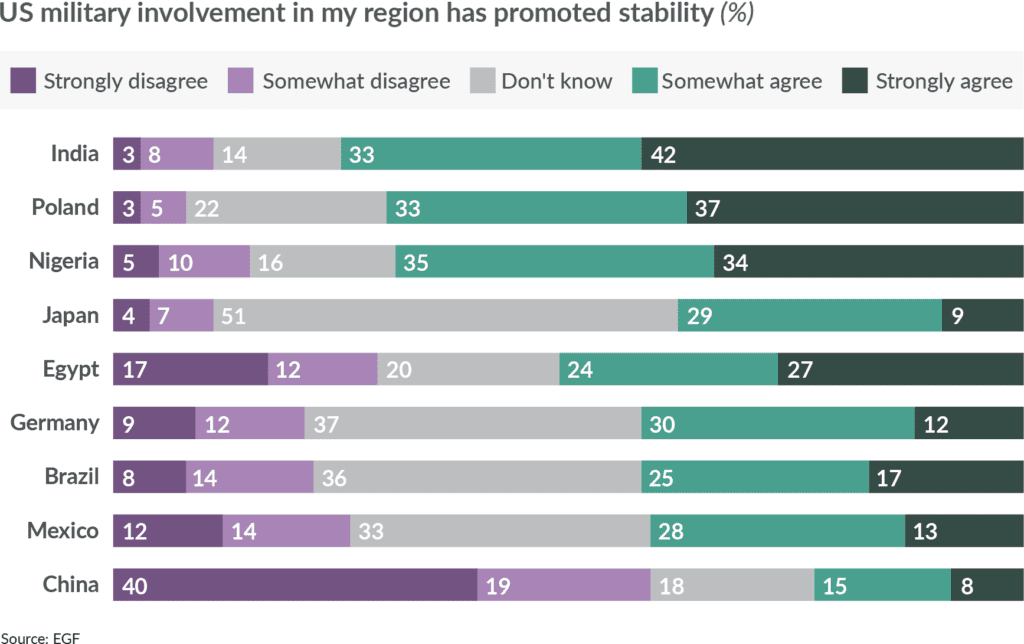
Since the first year this survey was fielded (2019), there has been a three to four percentage point increase in respondents who think the US has a responsibility to maintain international stability, and a four percentage point increase among those who think American military involvement in their region has promoted stability.
Older people, those over age 60, are more likely than any other age group to think the American military has a responsibility to maintain international stability and to think it has promoted stability in their region. Respondents with family and friends living in the US or those who have visited America are also more likely to support US power for maintaining international stability.
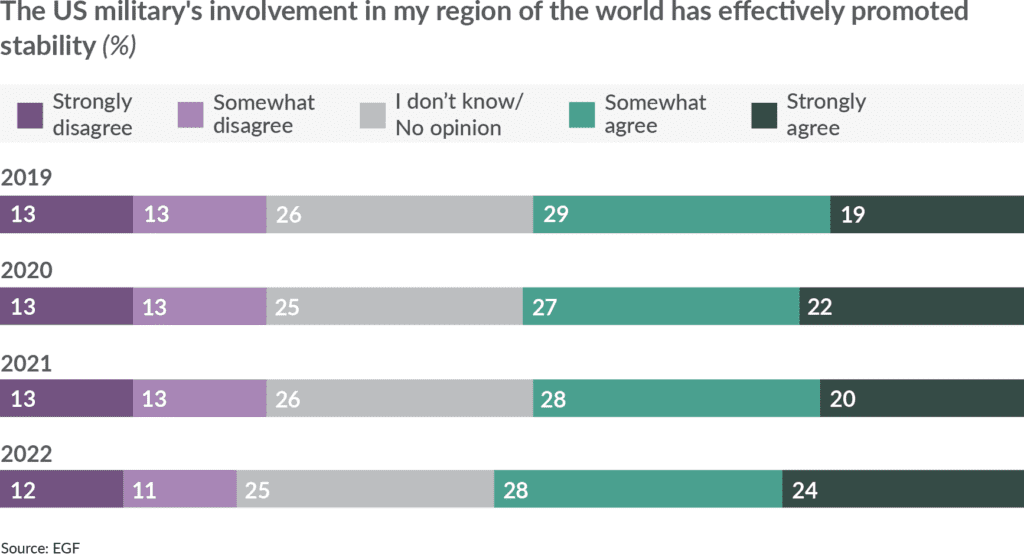
However, most respondents also agree US military bases in and around their country threaten their country’s national independence
The United States maintains an estimated 750 military bases across at least 80 countries. With the largest number of bases and troops in Germany and Japan.28
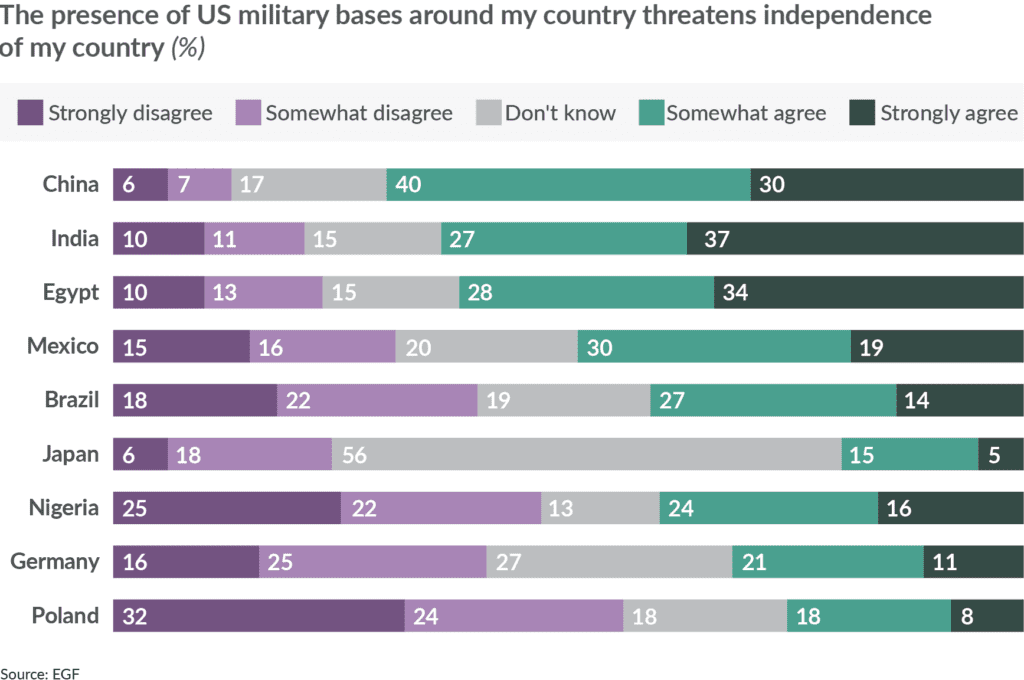
When asked if they agree or disagree that the presence of US military bases threatens the independence of their country, 47% agree. In Mexico, Egypt, and India, at least half of respondents agree. More than two thirds of Chinese respondents (70%) agree US military bases pose a threat to their country’s independence.
The belief that American military bases threaten the independence of the countries in which they are located has grown over time. The percentage of people surveyed who agree reached its highest point this year.
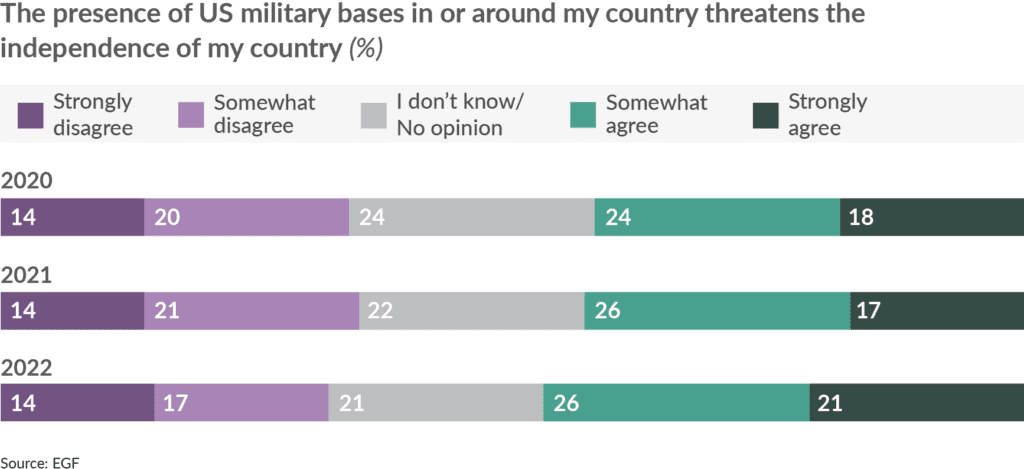
About half of respondents think American influence has a positive impact on their country/region and the world
Across the four years that this survey has been conducted, no less than 49% of survey participants report the US uses its influence to make the world a better place. But fewer than one in three surveyed in China, Germany, or Japan think of American influence positively. In China, over half indicated American influence made the world worse. In Germany and Japan, more than 40% reported that American influence made little or no difference.
We also asked about the impact of American influence in their country/region. Fewer than one-third of respondents in China, Germany, and Japan said American influence positively impacts their region. Nearly two-thirds in China responded that American influence makes their region worse, while more than 40% of individuals surveyed in Germany and Japan indicated US influence made little or no difference.
Across the sample, the more favorable respondents are toward American democracy and the US in general, the more likely they are to report the US has used its influence to make the world a better place over the last 20 years. It is worth noting that age appears to be a key variable. Respondents, between 36 and 60 are more likely than any other age group to think the US has a negative influence in the world.
Our survey findings indicate that respondents who think American foreign policy should be more restrained are less likely to have favorable views of the US. And for those who prefer China over the United States as a world leader, many think American style democracy would be more appealing if the foreign policy of the US were more restrained.
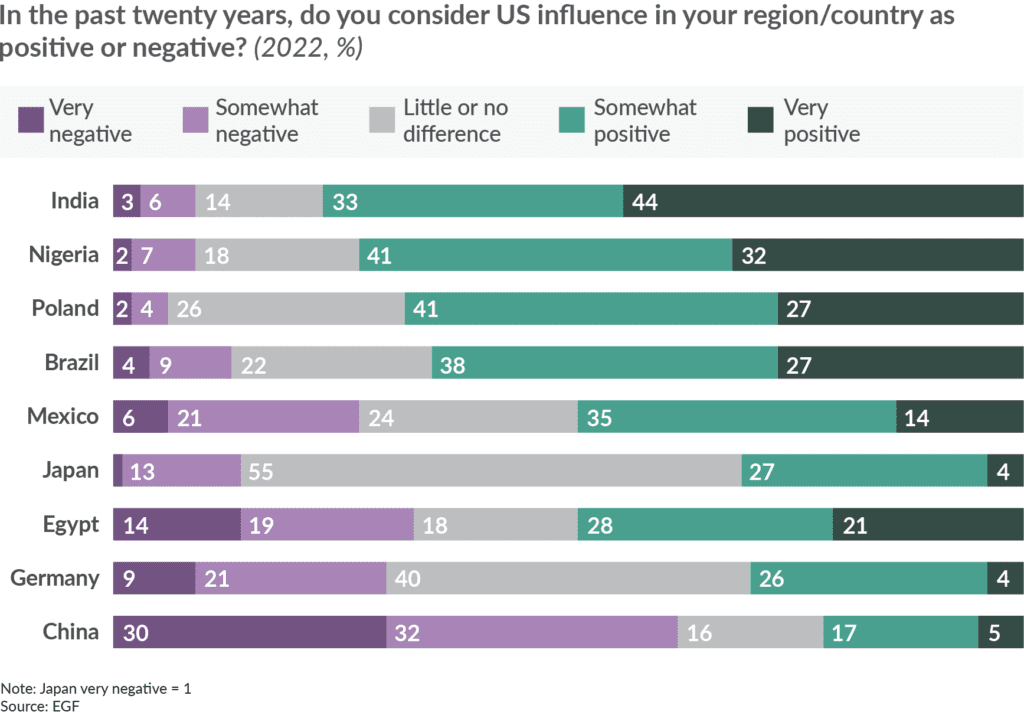
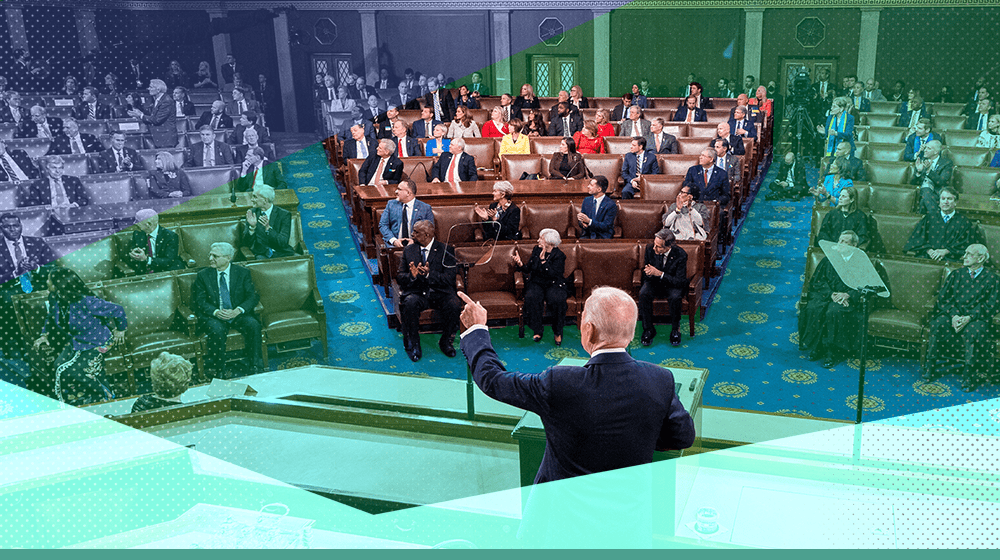
Views of American Democracy
In 2022, respondents are more favorable in their views of American democracy than any time in the past four years
There has been a steady yearly increase in overall favorable views of American democracy since 2020, with the largest change occurring between 2021 and 2022. Overall, respondents in 2022 reported more favorable views of American ideas of democracy compared to previous years.
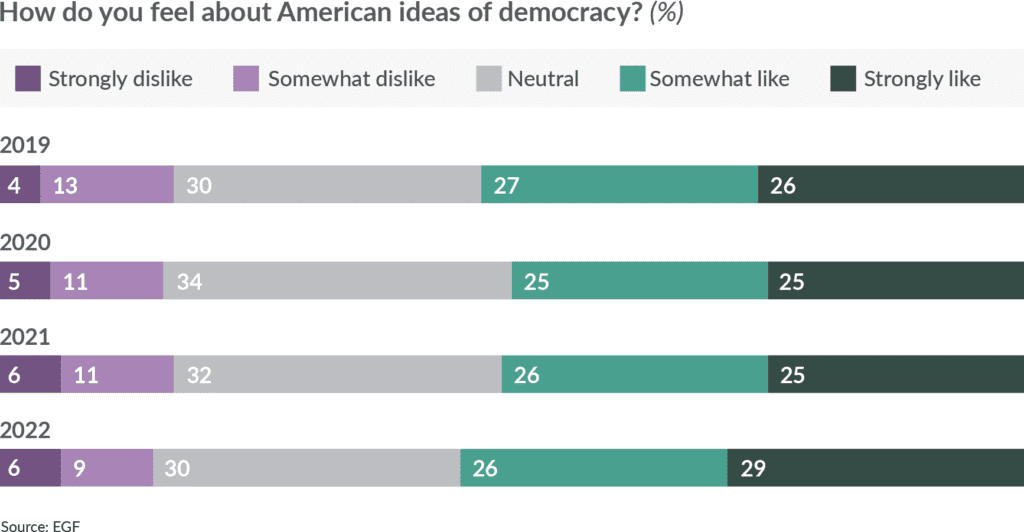
For example, in Germany — a country which tends to report more negative views of American democracy — favorable views of American democracy increased slightly, while unfavorable views decreased slightly between 2019 and 2022.
In China, there is a downward trend. In 2019, 44% of respondents in China reported liking American democracy. In 2022, that figure decreased to 32%. Similarly, the percentage who reported strongly disliking American democracy nearly tripled from 2019 to 2022 (5% to 17%, respectively). These findings are noteworthy given the deterioration of trade relations between the US and China during the Trump administration.
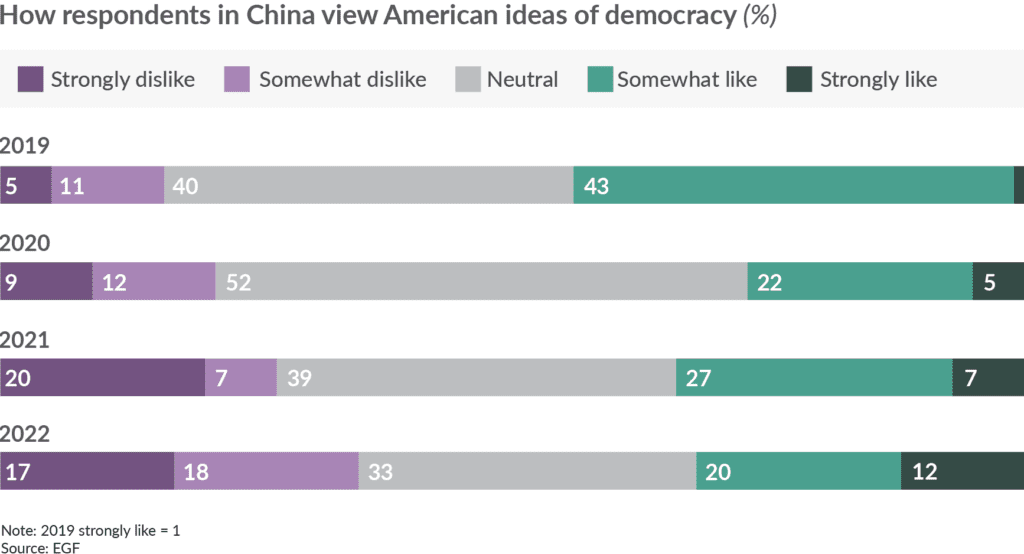
Most view American democracy positively and think it sets a good example for other countries
In 2022, more than three and a half times as many respondents like American democracy as dislike it. Favorable views of American democracy vary between and within these countries. Results from our samples in Nigeria and India show more than three-quarters like American democracy. In China, Germany, and Japan, conversely, fewer than a third of respondents like American democracy.
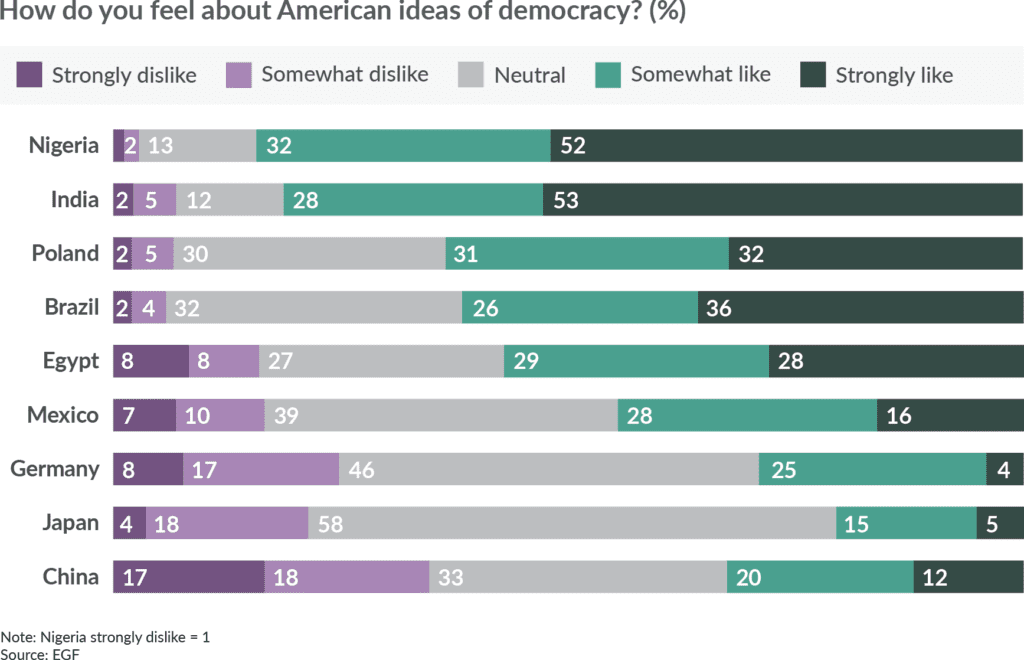
When asked why they held positive views of American democracy, the two most popular response categories selected were “the protection of individual liberties (e.g., freedom of speech and religion) is important” and “laws are better when politicians must be responsive to voters.”
For those who hold more negative views of American democracy, the most commonly cited rationale was
“the U.S. idea of democracy is hypocritical – ordinary voters don’t actually have power.”
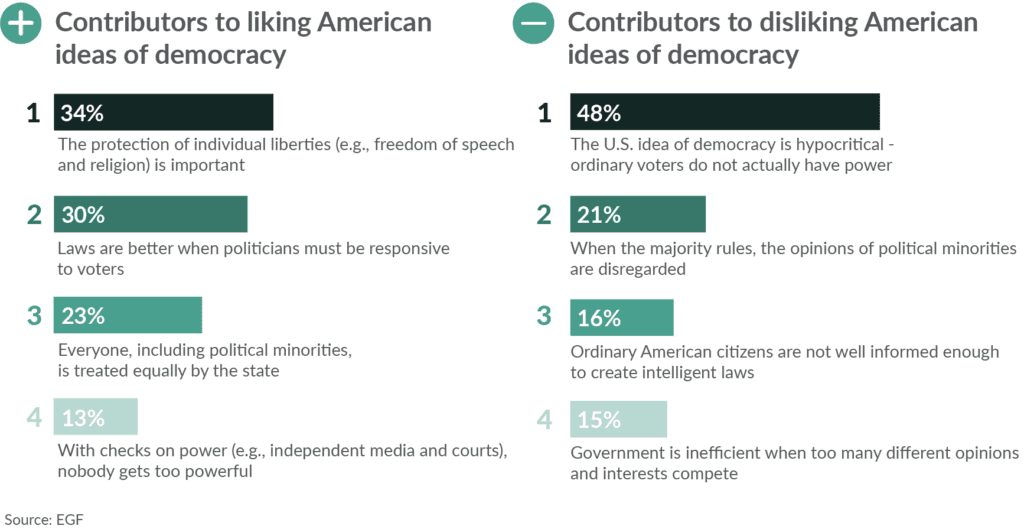
When asked to rank which country has the best form of government, the results from the top three countries among a list of fifteen were the United States (21%), Japan (13%), and China (12%). Germany and Canada followed.
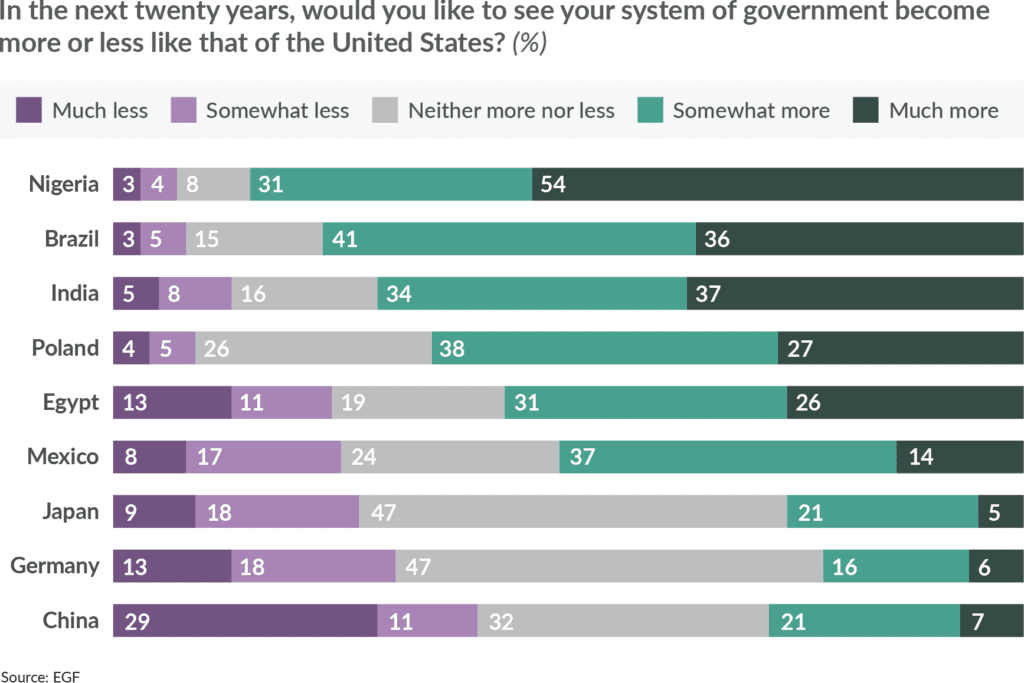
Results show roughly half (53%) want their own country’s system of government to be more like that of the United States. In Brazil, India, and Nigeria, this desire is most pronounced. Respondents in China, Germany, and Japan, on the other hand, are much less enthusiastic, with “neutral” responses accounting for one-third of responses in China, and about half in Germany and Japan. Still, most respondents (60%) think American democracy sets a positive example for the world.
What America does at home impacts how people view American democracy abroad
Survey participants were asked what would make American democracy more attractive in their country and to rank their top three choices. The three response categories which received the highest number of first choice rankings were: (1) the gap between the incomes of rich and poor people was smaller; (2) more immigrants and refugees were allowed to enter the US; (3) minority groups were treated more fairly.
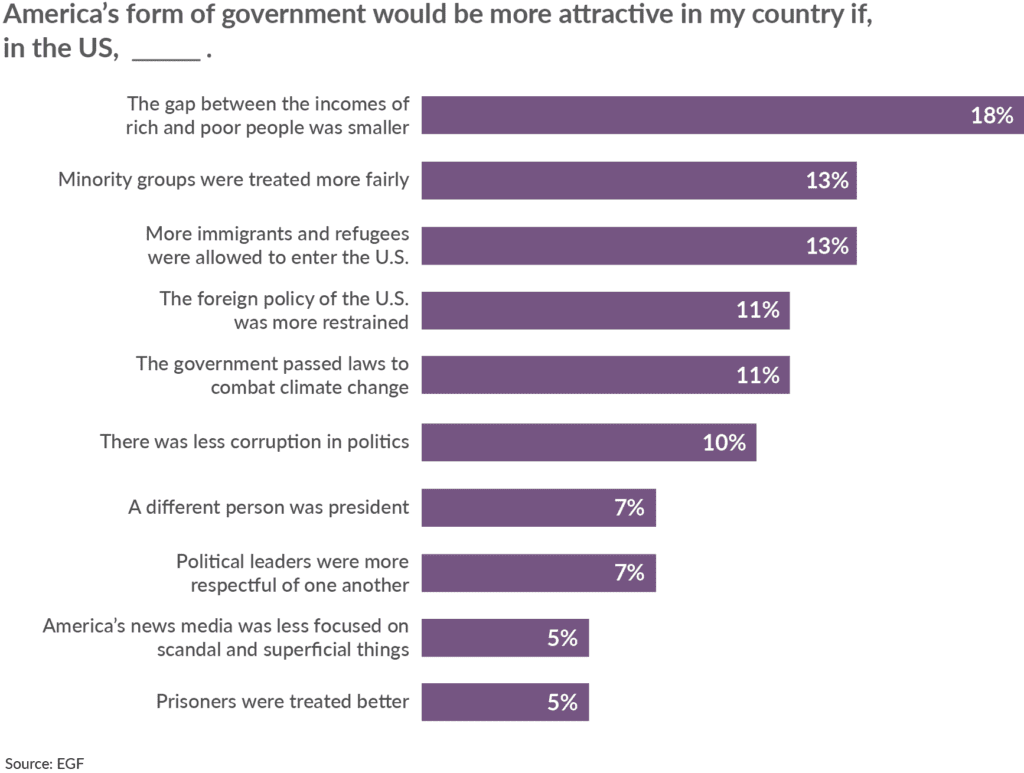
There is some variation between countries in how they rank unattractive attributes of America. For example, respondents in Germany are most concerned with minority rights and income inequality whereas in Egypt, US foreign policy and American immigration policy ranked highest. Respondents in China are most turned off by America’s foreign policy, as well as American immigration policy, and income inequality.
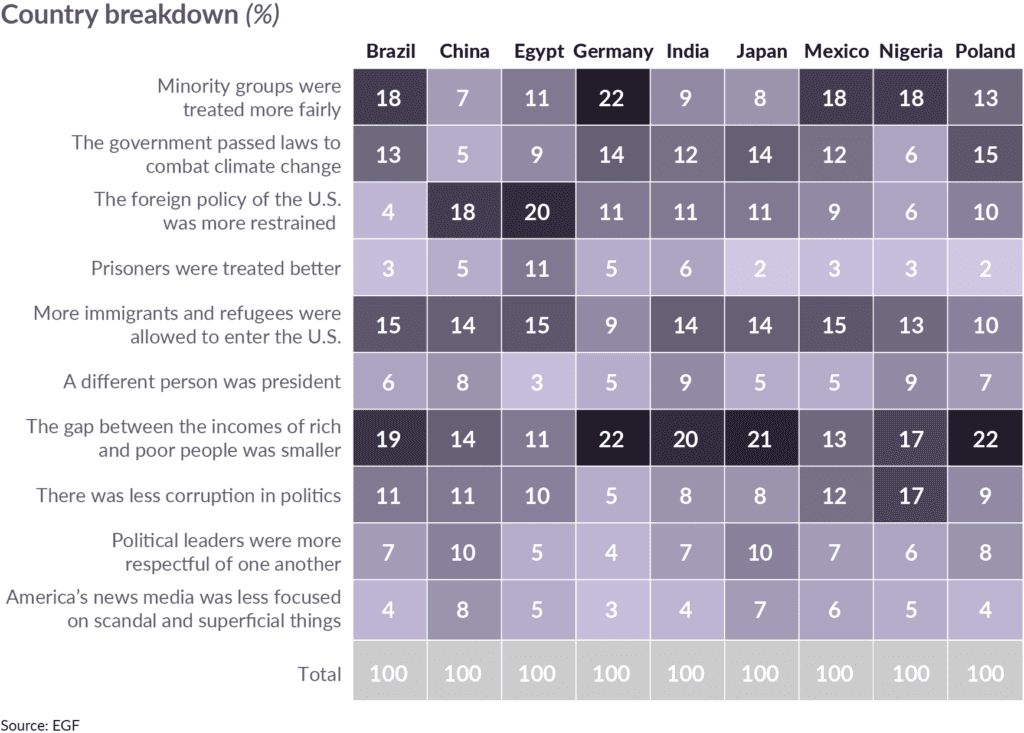
Those with the highest levels of education and a personal connection to the United States view American democracy positively
People with higher education in the nine countries surveyed tend to view American democracy more favorably. Approximately two-thirds of those who have completed post-secondary education view American democracy favorably while only two-fifths of people with only a primary level education do.
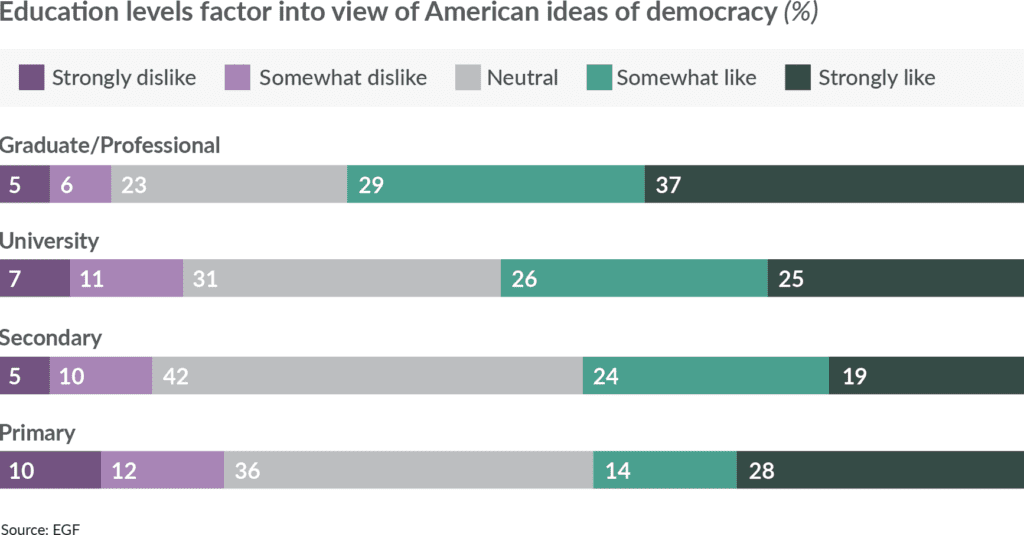
Differences by education level are more pronounced in some countries. In India, 87% of respondents with a graduate or professional degree view American democracy positively compared to 48% with primary level education. Similarly, those with higher levels of education were more likely to respond that they want their system of government to be more like the United States.
Respondents with personal connections to the United States tend to view American democracy more positively. People who have visited or lived in the United States for work or travel are more likely to have favorable views of American democracy than those who have not. Survey results show 66% of respondents who have visited the United States have positive views of American democracy compared to 48% who have not visited. The breakdown is similar for those who have friends or family living in the United States.
The breakdown in China highlights this pattern well. For instance, 53% of respondents in China who have visited the United States hold favorable views of American democracy compared to 19% who have never visited the US.
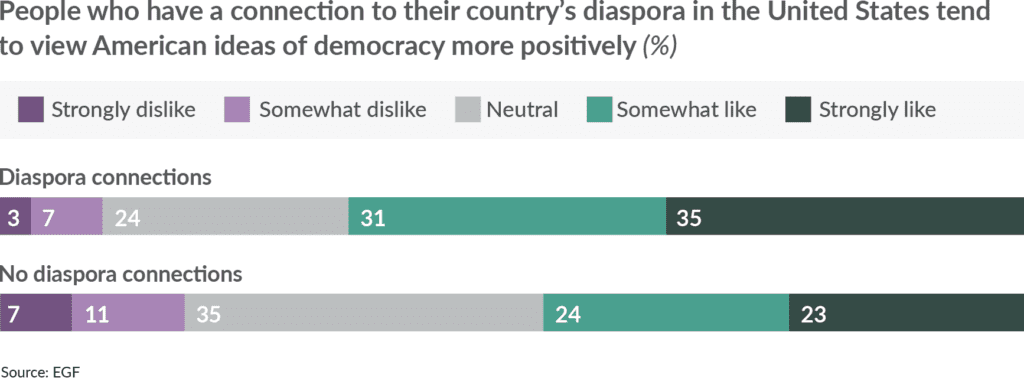
A few additional patterns stand out. Respondents in the highest age category (61 and older) across the nine countries surveyed tend to view American democracy more positively than other age categories. While 49% of respondents between 18 and 31 view American democracy positively, 60% of respondents above the age of 60 do.
Survey responses from countries which are treaty allies of the United States indicate less favorable opinions of American democracy than those from nonallied countries. Among America’s allies, only 43% of respondents view American democracy positively compared to 60% of respondents in countries which are not treaty allies.
Parting Thoughts for US Foreign Policy
Surveys are a bit like flashlights. They make visible important things otherwise hidden or unobserved. But their usefulness is necessarily limited to where and when they’re shined. And just as the qualities of the light (its brightness, color, etc.) influence the appearance of the things, so do the qualities of a survey (its topic range, word choice, etc.). Nevertheless, we think surveys such as ours essentially illuminate and reveal more than they conceal.
We at EGF also think that policymaking should be alert to public opinion, whether the opinion of the US public (on whose behalf it is done) or the opinion of foreign publics. It has become commonplace to critique a Washington-based foreign policy “establishment,” which is out-of-touch with the very hearts and minds it purportedly seeks to inspire. Such criticism can be overblown. Nevertheless, given how frequently political leaders and policymakers invoke, defend, and promote those who share America’s democratic ideals, it is important to more clearly understand specifically which ideals are held where, and to what extent they are actually shared.
“Given how frequently political leaders and policymakers invoke, defend, and promote those who share America’s democratic ideals, it is important to more clearly understand specifically which ideals are held where, and to what extent they are actually shared.”
As an organization focused on public education and engagement rather than policy advocacy, we didn’t design our survey instrument to generate findings beneficial or instructive for policy making. Nevertheless, we can imagine some of our data might usefully inform US foreign policy on several fronts. We conclude our report with some speculative applications of this research and some open-ended questions for those who create and enact policy.
Immigration debates have often been limited to economic and cultural consequences. Politicians grapple with the costs and benefits of high-skilled versus low-skilled immigrant workers, and whether these immigrants contribute to America’s cultural identity (e.g., as a nation of immigrants) or threaten it (e.g., by failing or refusing to assimilate).
When immigration is debated as part of US national security policy, some suggest violent extremists might cross the border illegally. But our findings imply the opposite: a permissive immigration policy might positively contribute to the national security of the US by spurring more pro-American sentiment. This sentiment gives foreign political leaders an incentive to work cooperatively with the US and adds a constraint on actions opposed to the US.
As reported, people who took our survey who had visited or lived in the United States, or have family and friends in the United States, are more likely to view the United States and its democracy favorably. This is particularly pronounced in China, which sends more foreign students to the US than any other country but which, amid political tensions and Trump-era visa restrictions continued by President Biden, saw a 20% dip in 2020.29 Mexico also has some of the least favorable views of the US, with nearly a third preferring Chinese to American international leadership. These numbers might be mitigated, in part, by more cross-border connections.
Aside from granting more foreign student visas, the US would act to its own advantage were it to support the efforts of other countries to educate their young people. Our survey finds education is one of the biggest predictors of pro-US attitudes. Several commentators have argued lack of educational opportunities in some countries with younger populations fuels violent extremist groups. While that is beyond the scope of our survey, we do provide empirical evidence that education is a predictor of positive views of the US.
When asked what would make American democracy more attractive in their country, the top three answer options were: (1) the gap between the incomes of rich and poor people was smaller; (2) more immigrants and refugees were allowed to enter the US; and (3) minority groups were treated more fairly. It’s perhaps not surprising that economic disparities are a leading concern. Though this is a global phenomenon, it is likely most conspicuous in this wealthy country, one which champions the free market model broadly perceived as contributing to it.
The concern about minority groups was particularly pronounced in Mexico, Nigeria, and Germany. All of these countries have been affected by migration. Germany has absorbed over a million refugees, half of which are from Syria, Mexico is a transit point for thousands of migrants from South America, and Nigeria faces serious challenges from people forcibly displaced by violence.30 That so many respondents think unfair treatment of minority groups is detracting from American democracy’s international appeal might suggest that one democracy promotion strategy would be to address racism and civil rights at home.
The fourth most frequently selected item to make American democracy more attractive is the wish for US foreign policy to be “more restrained.” But those who selected this reason were more likely to have unfavorable views of the US in general. And this response is a significant predictor of a preference for Chinese over American international leadership. This illustrates how perceptions of US military actions overseas relate to perceptions of the United States and its democracy.31
As the Biden administration seeks to recalibrate America’s forward deployed presence, take stock of its basing posture, and generally seek to adapt to a new strategic environment, it might consider how the recent approach to international security has undermined as well as advanced US interests.

Methodology
This survey was developed and commissioned by EGF. The survey instrument was written by Mark Hannah with the help of two research assistants in 2019 and updated for 2022 by Caroline Gray, Mark Hannah, and Zuri Linetsky. The survey was distributed online by Qualtrics, a large, commercial survey company to a geographically and demographically diverse sample of 4,995 adults. This included a sample of approximately 757 respondents in China, 768 in India, and 495 in each of the other seven countries. The survey was distributed between April 27 and May 16, 2021. Our survey partner created quotas to ensure gender and age balance.
We commissioned translators to translate and back-translate the survey instrument into the most commonly spoken language in each country surveyed and offered our survey respondents the option to complete the survey in that language or English. We did not translate the survey into other regional languages and dialects (e.g., Bengali in India or Cantonese in China).
For quality control, we worked with Qualtrics to ensure that the 4,995 respondents were real people and not bots, or people who take surveys professionally. All responses were checked against survey speed thresholds for each country surveyed, and individuals who selected all of the same answers for each question (i.e., checking the first response for each question) were flagged. IP addresses of survey respondents were collected to ensure they took the survey in the country they self-reported. (This is complicated by VPN use in countries like China.) All incomplete answers were excluded from the analysis.
Response categories for all non-demographic multiple- and rank choice-type questions were randomized. All analysis was conducted using Stata statistical software and Excel. Dr. Jonathan Forney and Brenton Petersen consulted with EGF on data analysis to ensure the validity of data analysis techniques. Establishing statistical significance in the associations between questions, we used cross-tabulation and multivariate regressions (both linear and ordered logistic regressions). All Likert scale questions were analyzed using ordered logistic regressions. Ordered logistic regressions are relevant when a dependent variable takes on a meaningful order, like Likert scales. Whenever reference is made in this report to a “significant” or “statistically significant” relationship, significance is established beyond the 0.05 level. Graphics included in the report are summary statistics or cross-tabulations (all cross-tabulation included in this report are statistically significant at the 0.05 level). Further analysis conducted on demographic characteristics like age, education, diaspora connections, and having visited the United States was done using linear or ordered logistic regressions. We welcome questions about the details of our analysis from other researchers.
The question about “American ideas of democracy” was taken from a Pew Global Attitudes Project survey in consultation with a senior member of the research staff there. Depending on the user’s response to that question, we used a skip logic function to pose a follow-up question seeking reasons for “liking” or “disliking” American ideas of democracy. This same skip logic function was used for the question “Having __ as the world’s leading power would be better for my country.” Depending on the user’s response to that question, we sought reasons for selecting either “China” or “The United States.”
Limitations
Since this survey relies on data collected online from a narrow sample of respondents there are several limitations. First, this survey may be affected by sampling bias. Qualtrics has panels of respondents in each country, but there is limited data available on how or why respondents join these panels. As is evident from the data gathered from survey respondents, Qualtrics survey respondents tend to be comparatively well educated and employed, and therefore our sample might not effectively represent less educated and unemployed people. Since this is an online survey, all respondents must be adept at using internet enabled devices like tablets, smart phones, or computers. People lacking these skills and these devices cannot participate in this survey, and therefore their views are not captured.
Various forms of response bias may affect the data used in this analysis as well. In China, for example, negative views of the US may be driven, at least in part, by some form of social desirability bias, a desire to answer questions in a way that is socially or morally correct. The threat of this type of bias can be mitigated by the fact that these surveys are taken on individuals’ phones, tablets, and computers, and responses are not public. And, the survey collected no identifying information, so respondents could feel more confident that their responses would not be traced back to them.
Acquiescence and neutral bias may affect this survey as well. Since this is an online survey that relies on Likert scale questions, respondents may choose the most positive or the most neutral answer to each question. For acquiescence bias, respondents may think, since this is an American-focused survey, that the researchers want to elicit positive views of the United States. For neutral bias, culture and question type may affect respondents choices. Some people may not be comfortable expressing strong opinions, or the questions as written may not represent the full range of potential responses. Regardless, to mitigate both of these forms of bias the survey instrument was kept as short as possible, and responses were randomized so people could not simply pick an extremely positive or neutral response option based on looking at a scale. Neutral responses are not dropped or combined with other answer categories for analysis.
About EGF
EGF is a nonpartisan nonprofit organization which works to connect people to the geopolitical issues shaping their world. Fostering a greater understanding of the issues broadens debate and empowers informed engagement. EGF makes complex geopolitical issues accessible and understandable.
Mark Hannah is a senior fellow at EGF. He teaches at New York University and taught previously at The New School and Queens College. He is a term member of the Council on Foreign Relations and a political partner at the Truman National Security Project. He studied at the University of Pennsylvania (B.A.), Columbia University (M.S.), and the University of Southern California (Ph.D.).
Zuri Linetsky is a research fellow at EGF. He has worked extensively throughout the Middle East and
sub-Saharan Africa as an international development practitioner. He holds a Ph.D. in foreign affairs from the University of Virginia.
Caroline Gray is a senior researcher and producer at EGF. She previously worked on the policy team of the Truman National Security Project in Washington, DC, and interned with the Brookings Institution in New Delhi. She studied international affairs and political economy at Lewis & Clark College (B.A.) in Portland, Oregon.
Lucas Robinson is an external relations associate at EGF. He studied history at the University of California, Los Angeles (B.A.) and theory and history of international relations at the London School of Economics and Political Science (M.Sc.).
Endnotes
- Simon Lewis and Humeyra Pamuk, “Renewing Democracy is ‘Defining Challenge of Our Time,’ Biden Tells Summit,” Reuters, December 9, 2021, Retrieved from: https://www.reuters.com/world/us/biden-summit-democracy-rally-nations-against-rising-authoritarianism-2021-12-09/.
- Sarah Repucci and Amy Slipowitz, “Freedom in the World 2021: The Global Expansion of Authoritarian Rule,” Freedom House, February 2022. Retrieved from: https://freedomhouse.org/report/freedom-world/2021/democracy-under-siege.
- “As of today, some 38 percent of the global population live in Not Free countries, the highest proportion since 1997. Only about 20 percent now live in Free countries.” Retrieved from: https://freedomhouse.org/sites/default/files/2022-02/FIW_2022_PDF_Booklet_Digital_Final_Web.pdf.
- Steven Feldstein, “Who’s In and Who’s Out From Biden’s Democracy Summit,” Carnegie Endowment for International Peace, November 22, 2021. Retrieved from: https://carnegieendowment.org/2021/11/22/who-s-in-andwho-s-out-from-biden-s-democracy-summit-pub-85822.
- “Reps From Both Political Parties Deliver Anti-War Message,” NowThis Politics and Eurasia Group Foundation, Facebook Post, June 8, 2021. Retrieved from: https://www.facebook.com/NowThisPolitics/videos/2870809519803835/.
- Lindsay Maizland, “China’s Repression of Uyghurs in Xinjiang,” Council on Foreign Relations, March 1, 2021. Retrieved from: https://www.cfr.org/backgrounder/chinas-repression-uyghurs-xinjiang.
- Alexandria Nylen, Archibald Henry, Fiona Campbell, Lauren Woods, and Sarah Haviland, “US Security Partnership and the Protection of Civilians: The Case of Nigeria and the Nigerian Armed Forces,” Brown University Center for Human Rights and Humanitarian Studies, Security Assistance Monitor at the Center for International Policy, and InterAction, May 2022. Retrieved from: https://securityassistance.org/publications/u-s-security-partnership-and-the-protection-of-civilians-the-case-of-nigeria-and-the-nigerian-armed-forces/.
- Mujib Mashal and Hari Kumar, “Maoist Insurgents Kill 23 Indian Forces in Ambush, Officials Say,” The New York Times, April 6, 2021. Retrieved from: https://www.nytimes.com/2021/04/04/world/asia/india-maoist-insurgents-ambush.html.
- All year-by-year analysis in this section, “Views of Recent Foreign Policy Decisions,” excludes data collected in past years from Russia as there was no data collected from there in 2022. Though other sections also exclude data collected from Mexico in their year-by-year analysis, Mexico data is included in this section because Mexico was first introduced to the survey in 2020 — the same year questions pertaining to preferences for either the United States or China were introduced. In 2021, the question on America’s management of the coronavirus pandemic was introduced, and, in the same year, respondents were also asked, “Do you think the US should keep military troops in Afghanistan until the situation has stabilized, or do you think the US should remove their troops as soon as possible?”
- Respondents were classified as “liberal” or “illiberal” based on their answers to three questions, which asked whether or not they thought their government should restrict immigration of certain religious groups to maintain national unity, block political protests if they disrupt social order, and restrict social media content if it disrupts social order.
- Nick Niedzwiadek, “Biden Announces Withdrawal from Afghanistan in Speech Heavy on Symbolism,” Politico, April, 14, 2021. Retrieved from: https://www.politico.com/news/2021/04/14/biden-announces-withdrawal-afghanistan-481524.
- David Rothkopf, “Biden Deserves Credit, Not Blame, for Afghanistan,” The Atlantic, August 30, 2021. Retrieved from: https://www.theatlantic.com/ideas/archive/2021/08/biden-deserves-credit-not-blame-for-afghanistan/619925/.
- Mathew Karnitschnig, “Disbelief and Betrayal: Europe Reacts to Biden’s Afghanistan ‘Miscalculation’,” Politico, April 17, 2021. Retrieved from: https://www.politico.eu/article/europe-reacts-bidens-afghanistan-withdrawal/.
- Allies in this report are defined as countries which have a formal collective defense treaty with the United States. This includes Germany, Poland, Japan, and Brazil. Brazil and the United States are parties to the Rio Treaty.
- Lindsay Maizland and Sabine Baumgartner, “A Look at Afghanistan’s Humanitarian Crisis,” Council on Foreign Relations, January 12, 2022. Retrieved from: https://www.cfr.org/article/afghanistan-humanitarian-crisis-famine-foreign-aid-taliban.
- “United States Announces Additional Humanitarian Assistance for the People of Afghanistan,” US Department of State, March 31, 2022. Retrieved from: https://www.state.gov/united-states-announces-additional-humanitarian-assistance-for-the-people-of-afghanistan/.
- Kevin Liptak and Natasha Bertrand, “Biden Unfreezes Afghan Funds for In-country Relief and 9/11 Legal Fight,” CNN, February 12, 2022. Retrieved from: https://www.cnn.com/2022/02/11/politics/executive-order-afghanistan-9-11-humanitarian-aid/index.html.
- “FACT SHEET: United States, G7 and EU Impose Severe and Immediate Costs on Russia,” The White House, April 6, 2022. Retrieved from: https://www.whitehouse.gov/briefing-room/statements-releases/2022/04/06/fact-sheet-united-states-g7-and-eu-impose-severe-and-immediate-costs-on-russia/.
- Jessica Trisko Darden, “US Aid to Ukraine: $13.6 billion Approved Following Russian Bombardment Marks Sharp Increase,” The Conversation, March 14, 2022. Retrieved from: https://theconversation.com/us-aid-to-ukraine-13-6-billion-approved-following-russian-bombardment-marks-sharp-increase-179172.
- Julian E. Barnes, Helene Cooper, and Eric Schmitt, “US intelligence Is Helping Ukraine Kill Russian Generals, Officials Say,” The New York Times, May 4, 2022. Retrieved from: https://www.nytimes.com/2022/05/04/us/politics/russia-generals-killed-ukraine.html.
- John Wagner and Ashley Parker, “Biden Says US Ground Troops ‘Not on the Table’ for Ukraine,” Washington Post, December 8, 2021. Retrieved from: https://www.washingtonpost.com/politics/biden-says-ground-troops-not-on-the-table-but-putin-would-face-severe-economic-sanctions-for-ukraine-invasion/2021/12/08/3b975d46-5843-11ec-9a18-a506cf3aa31d_story.html.
- David E. Sanger and William J. Broad, “Putin Declares a Nuclear Alert, and Biden Seeks De-escalation,” The New York Times, February 27, 2022. Retrieved from: https://www.nytimes.com/2022/02/27/us/politics/putin-nuclear-alert-biden-deescalation.html.
- From this section, “Views of the United States,” through the rest of the report, Russia and Mexico were removed from all year-to-year analysis since neither of these countries were surveyed in each of the four years discussed in the rest of this report, 2019-2022.
- When reference is made to a “significant” or “statistically significant” relationship, significance has been established beyond the 0.05 level.
- Respondents were identified to have a diaspora connection or to have visited the United States based on their response to the question, “Which of the following has applied to you within the past five years? (Check all that apply).” Answer choices that correspond to diaspora connections include: “I have had family members who lived in the US” and “I have had close friends who lived in the US.” Answer choices that correspond to having visited the United States include: “I have visited the US as a tourist,” “I have visited the US for work/educational reasons,” and “I have lived in the US for more than 3 months.”
- “US Security Assistance and Security Cooperation Programs: Overview of Funding Trends,” Congressional Research Service, “ February 1, 2018. Retrieved from: https://www.everycrsreport.com/files/20180201_R45091_2098bdf28f84e93b78991847f4f2c007851481d3.pdf.
- “US-Mexico Security Cooperation: From the Mérida Initiative to the Bicentennial Framework,” Congressional Research Service, April 7, 2022. Retrieved from: https://sgp.fas.org/crs/row/IF10578.pdf.
- Mohammed Hussein and Mohammed Haddad, “Infographic: US Military Presence Around the World,” Al Jazeera, September 10, 2021. Retrieved from: https://www.aljazeera.com/news/2021/9/10/infographic-us-military-presencearound-the-world-interactive. See also, David Vine, Patterson Deppen and Leah Bolger, “Drawdown: Improving US and Global Security Through Military Base Closures Abroad,” Quincy Institute for Responsible Statecraft, September 20, 2021. Retrieved from: https://quincyinst.org/report/drawdown-improving-u-s-and-global-security-through-military-base-closures-abroad/.
- Fu Ting, “Chinese Student Hit by US Visa Rejections Amid Tension,” AP News, September 14, 2021. Retrieved from: https://apnews.com/article/technology-lifestyle-donald-trump-china-education-be7fc34757c7ed54d995ebe77772d461.
- “Mexico: Asylum Seekers Face Abuses at Southern Border,” Human Rights Watch, June 6, 2022. Retrieved from: https://www.hrw.org/news/2022/06/06/mexico-asylum-seekers-face-abuses-southern-border; “Nigeria emergency,” United Nations High Commissioner for Refugees, accessed June 8, 2022. Retrieved from: https://www.unhcr.org/en-us/nigeria-emergency.html; “Germany,” United Nations High Commissioner for Refugees, accessed June 8, 2022. Retrieved from: https://www.unhcr.org/en-us/germany.html.
- The authors wish to acknowledge the skillful assistance of our talented research assistants and consultants in the development and execution of this survey and report. Dr. Jonathan Forney and Brenton Peterson were instrumental with their expert data analysis. Frank Schneegas contributed writing assistance. Former EGF interns, Keenan Ashbrook and Cartland Zhou, supported the development of the original survey instrument in the summer of 2018.
This post is part of Independent America, a research program led out by Jonathan Guyer, which seeks to explore how US foreign policy could better be tailored to new global realities and to the preferences of American voters.



























Don’t bring the war on terror to the Western Hemisphere